#BUT here's the thing u asked for :)
Explore tagged Tumblr posts
Text
this is just my opinion but i think any good media needs obsession behind it. it needs passion, the kind of passion that's no longer "gentle scented candle" and is now "oh shit the house caught on fire". it needs a creator that's biting the floorboards and gnawing the story off their skin. creators are supposed to be wild animals. they are supposed to want to tell a story with the ferocity of eating a good stone fruit while standing over the sink. the same protective, strange instinct as being 7 and making mud potions in pink teacups: you gotta get weird with it.
good media needs unhinged, googling-at-midnight kind of energy. it needs "what kind of seams are invented on this planet" energy and "im just gonna trust the audience to roll with me about this" energy. it needs one person (at least) screaming into the void with so much drive and energy that it forces the story to be real.
sometimes people are baffled when fanfic has some stunning jaw-dropping tattoo-it-on-you lines. and i'm like - well, i don't go here, but that makes sense to me. of fucking course people who have this amount of passion are going to create something good. they moved from a place of genuine love and enjoyment.
so yeah, duh! saturday cartoons have banger lines. random street art is sometimes the most precious heart-wrenching shit you've ever seen. someone singing on tiktok ends up creating your next favorite song. youtubers are giving us 5 hours of carefully researched content. all of this is the impossible equation to latestage capitalism. like, you can't force something to be good. AI cannot make it good. no amount of focus-group testing or market research. what makes a story worth listening to is that someone cares so much about telling it - through dance, art, music, whatever it takes - that they are just a little unhinged about it.
one time my friend told me he stayed up all night researching how many ways there are to peel an orange. he wrote me a poem that made me cry on public transportation. the love came through it like pith, you know? the words all came apart in my hands. it tasted like breakfast.
#warm up#writeblr#actually this is because again i don't go here#i don't read/write fanfic but i have nothing but respect for my troops#but i also have never played minecraft. im sorry. please ask me any question about pokemon tho i love that shit#anyway#out of some banal and thoughtless curiosity i watched the minecraft movie trailer#and again i know nothing about minecraft. i am aware im in an endangered population#but im watching this going: this is so fucking.... BAD#there is NO LOVE in it!#like if someone who has NO history in minecraft watches that and is like - ohhh this is soulless#WHO IS THE AUDIENCE????#ppl who love minecraft are gonna hate it!!!#at some point it's the ''mean girls musical movie'' problem --#some people will always hate the premise of what you're doing and some people will love it#make it for the ppl who love it#and usually that somewhat convinces the haters to like. chill enough to TRY it . bc it IS good#but when you try to make it for the haters..... nobody likes it. it doesn't have passion. energy. footwork#which is a small way of saying a big thing: if you love something. fucking make it and assume someone will love it too.#i love u . be brave . be bold. be in boston and come to my reading#where i wrote a really weird fucked up little book.#love u love u love u etc
11K notes
·
View notes
Text
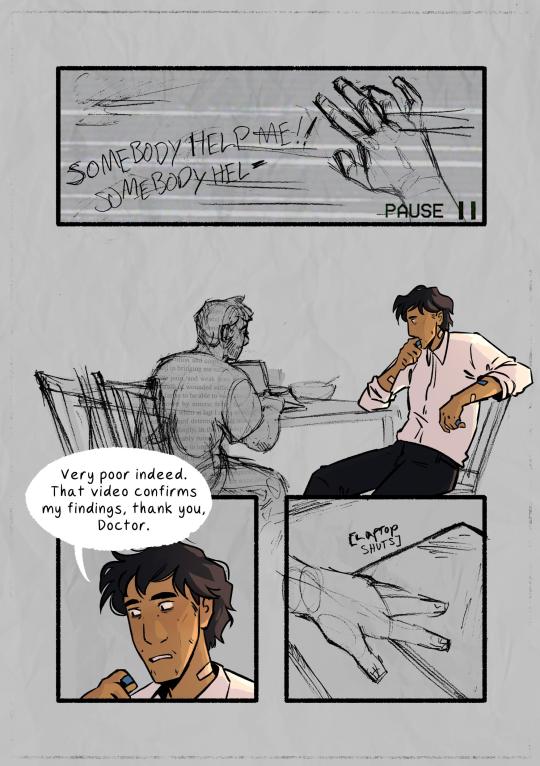
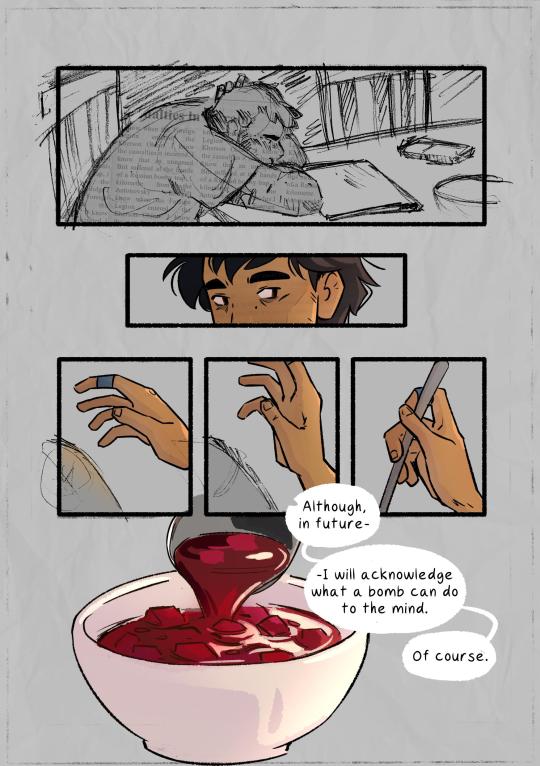
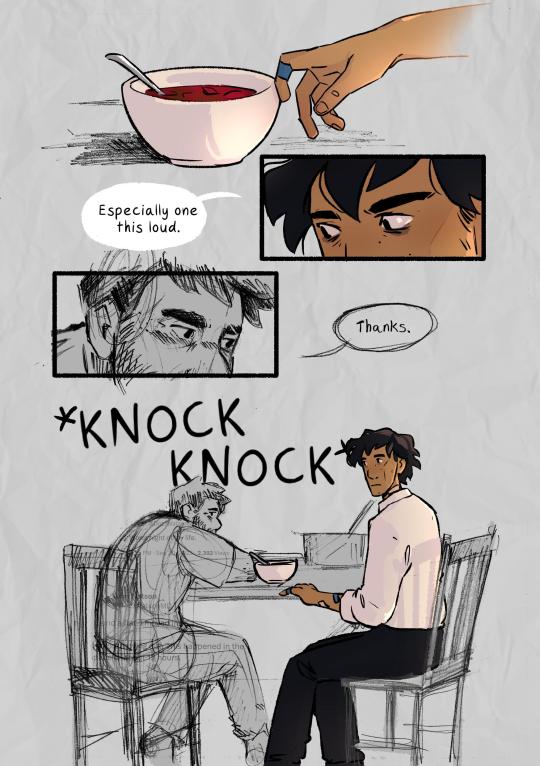
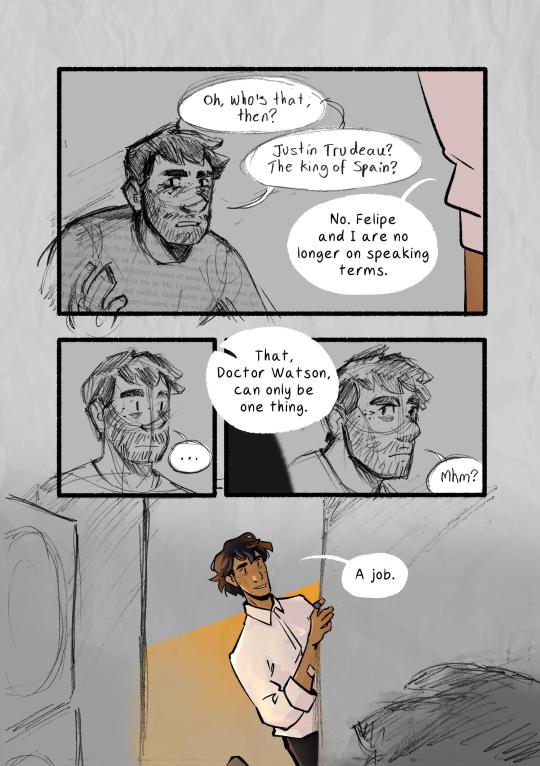
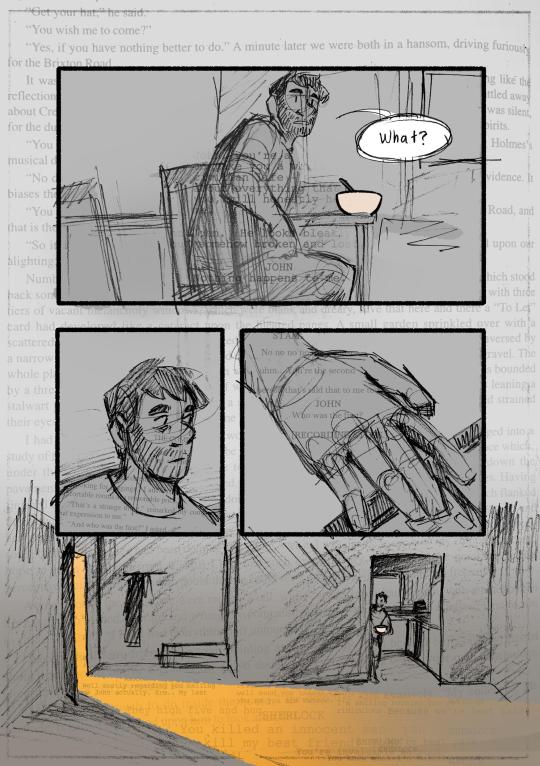
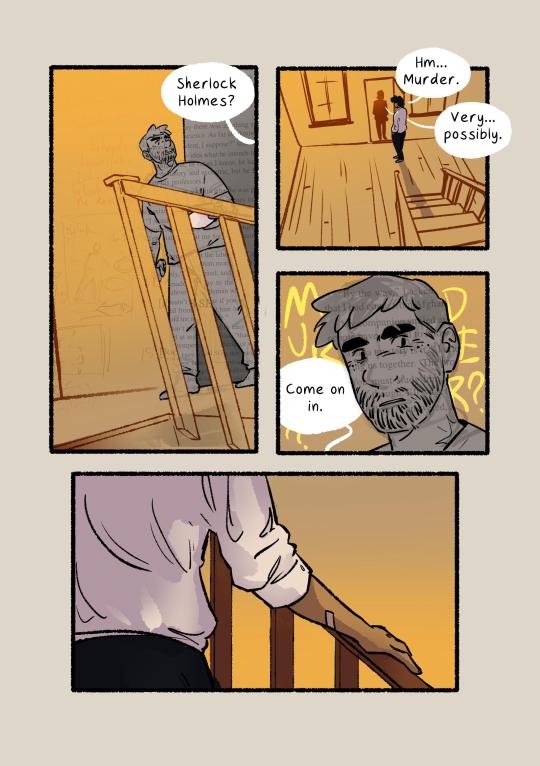
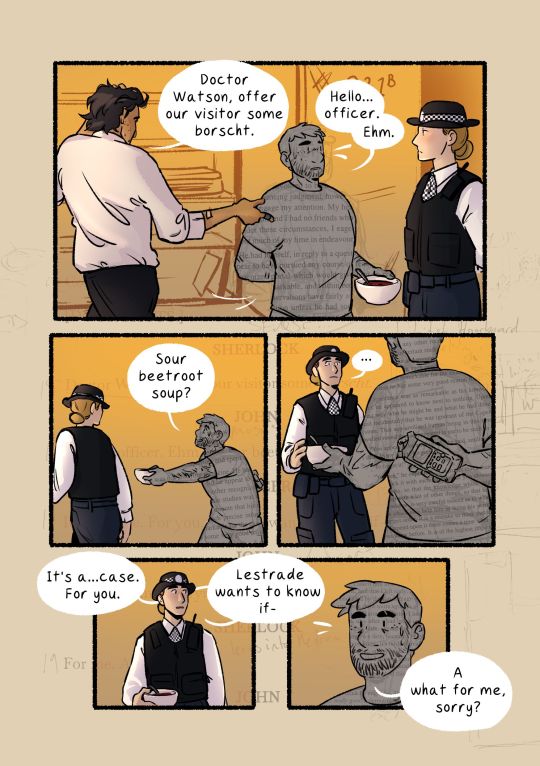
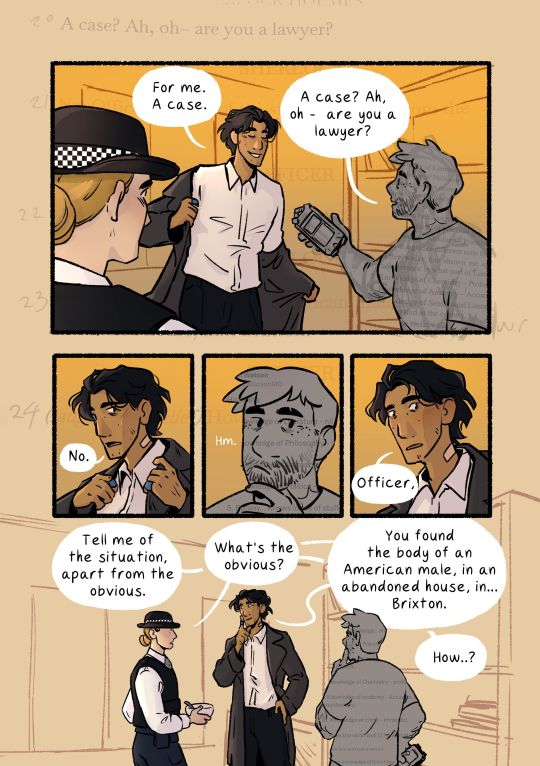
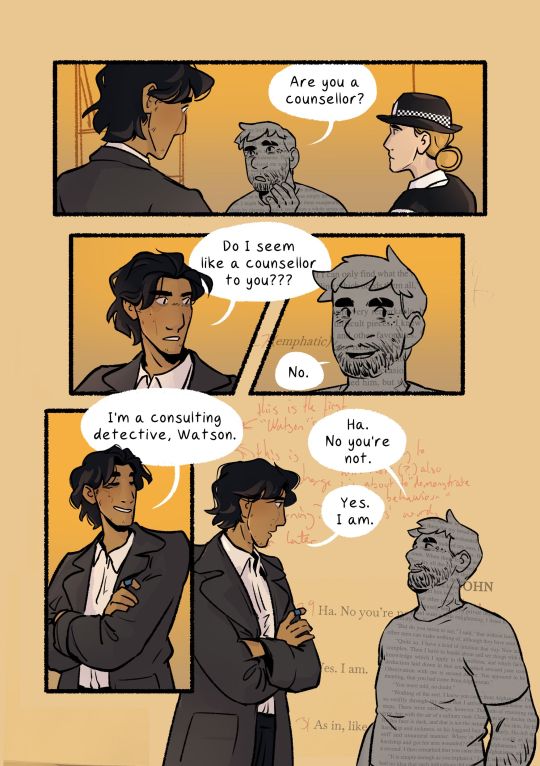
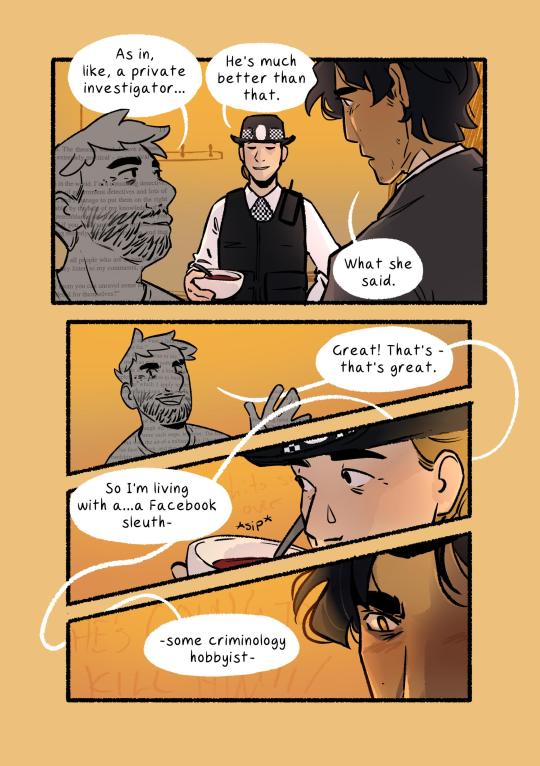
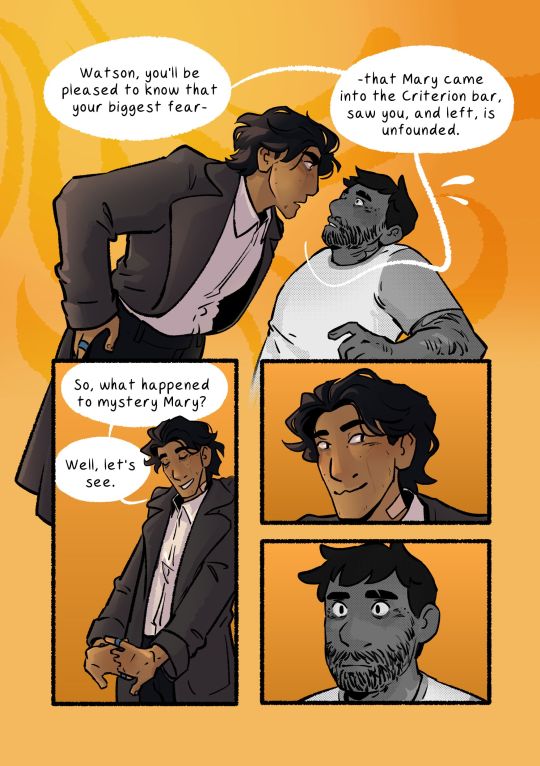
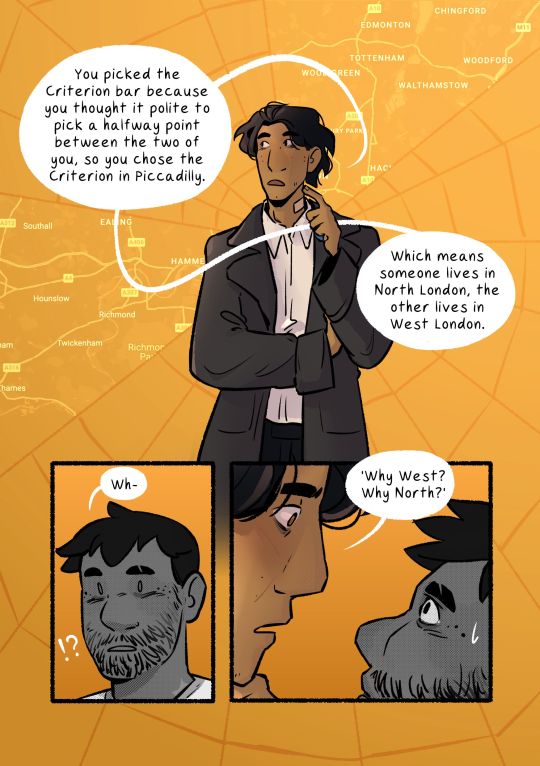
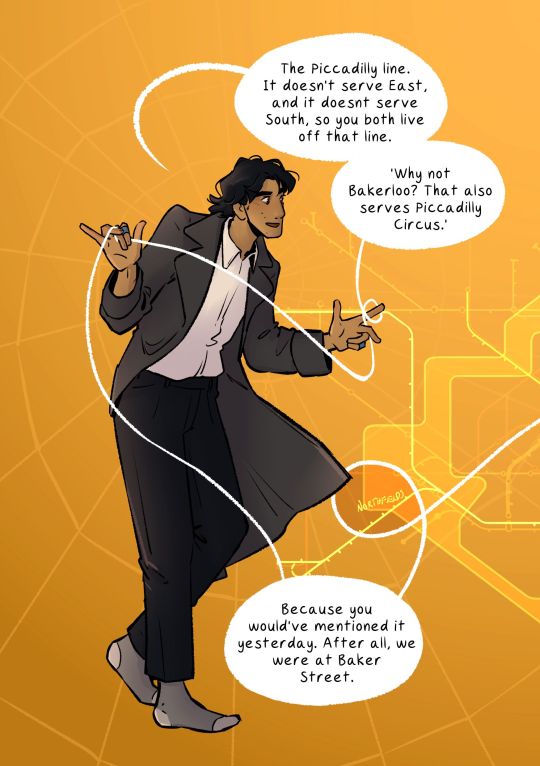
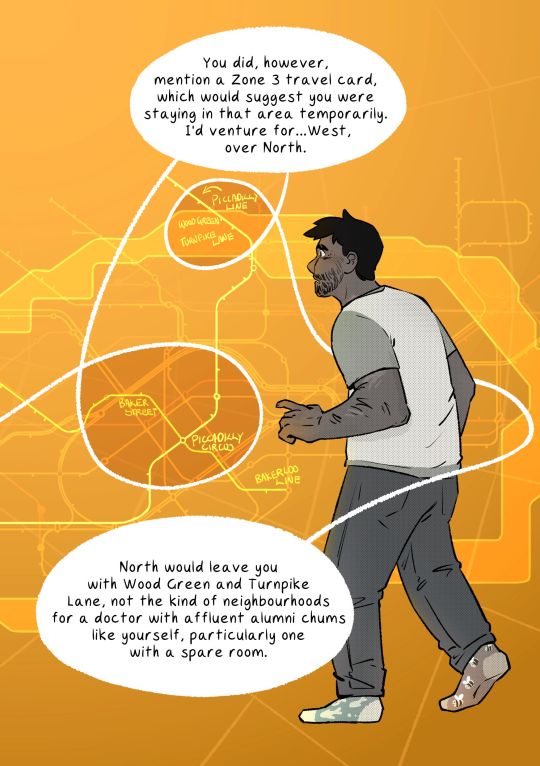
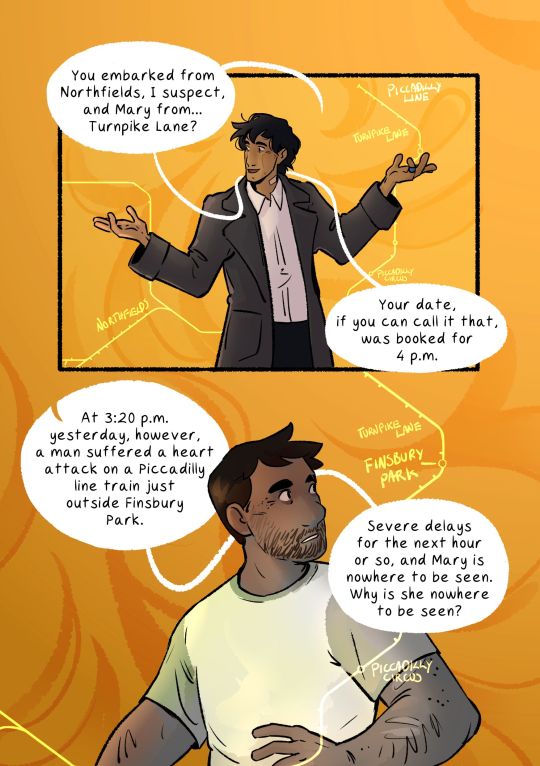
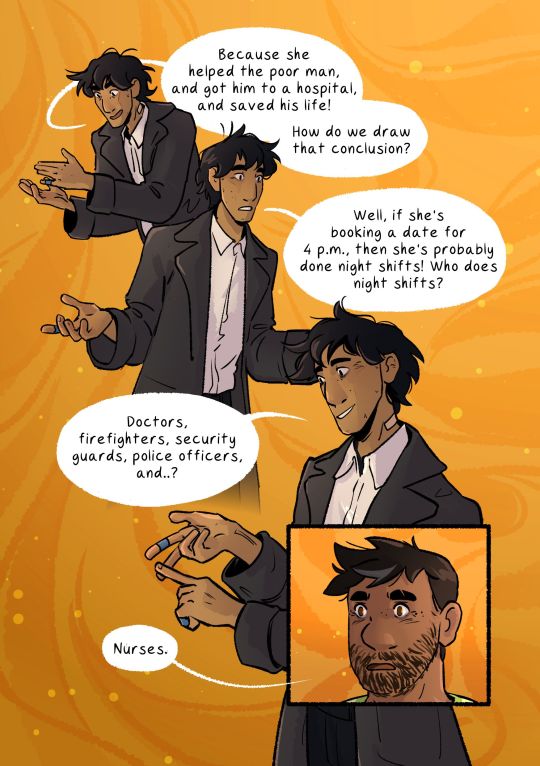
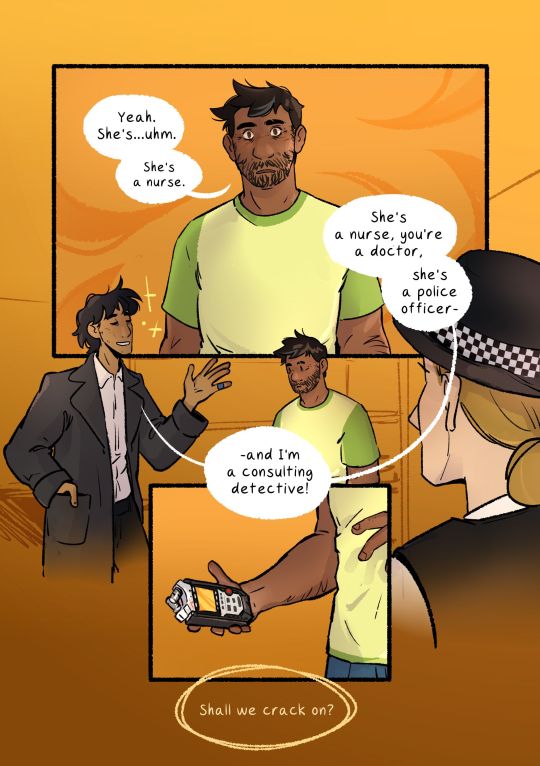
Happy 1 year anniversary to Mr Sherlock Holmes! Here's a litttleee celebratory comic from me
#sherlock & co#sherlock and co#writing these tags on the 29th of september#which is when john and sherlock ACTUALLY met <3#so there you go#uh once again shout out to candy for letting me talk through some of my processes#it helps immensely and i really wanted to be sure i was getting across what i wanted to with this one#speaking of which - usually i yap a lot in the tags of these bcus i love talking about art#for this one...im not sure i want to comment too much#because i'll be here forever and i think most things can speak for themself#but let me say this one thing#for the first five pages i was drawing john on paper and sherlock on the computer exclusively#and then bringing them together..#uh it really made me think of paul and harry. recording on opposite sides of the world. brought together by the power of editing#its not a particularly emotional scene but i hope ive infused it with. something.#anyway thats it from me#if u want to ask about any particular aspect i would love to yap about the process but i'll just leave it here for now or i'll never shut u#happy 1 year podpals#patsart#oh yeah i will say i did have to take quite a bit of liberty with the audio in order to do what i wanted. forgive me#or dont idc
1K notes
·
View notes
Text
Waking up with Jason's arms wrapped around you, feeling him breathe into your hair, letting out the occasional snore. His hand is under you, pressed into your side, and you feel him squeeze the flesh of your waist to make sure you're still there, a habit he developed when things started getting serious, constantly searching for you, even in his sleep. He squeezes a little tighter, his breath suddenly quickening at an alarming rate. You try to turn to face him, fear settling in your stomach, wondering if something was plaguing him in his dreams again.
When you shift ever so slightly, you feel the other arm lying over you tighten, pulling you flush against his body. A chill runs down your spine as you feel him exhale a particularly strangled breath, and you force yourself out of his grip, sitting up to get a better look at the man next to you. His eyebrows furrowed, hair flat on one side of his head from laying in one position the entire night. One of his hands reaches out to your pillow, searching for you in your sudden absence, and when it's met with nothing, Jason jolts upright. He turns his head frantically, blurred vision searching for something, for someone, for you.
His shoulders drop in relief when he finally stops long enough to notice you barely a foot away from him. You watch his chest rise and fall as he tries to calm his breathing, and you're not sure which thing caused it, the nightmare or the fear that you had left him. "What are you doing up?" he asks, voice laced with sleep. "You were having a nightmare," you say quietly, sliding a little closer to him and settling back into your spot on the bed. "I was just trying to make sure you were okay." confusion is etched across his face like the concept of him having a nightmare was foreign, and you develop an equally confused expression upon seeing his own. His face drops suddenly, and he clears his throat, "Right, a nightmare." he shifts beneath the covers, seemingly uncomfortable. "I'm all good. Just go back to sleep, okay?" he sends a reassuring smile your way, his attempt at trying to make you forget this whole debacle and coax you back to sleep, but it was too late; you were already wide awake.
"Was it him again?" your hand finds the scarred expanse of his back, lightly grazing your fingers against old wounds and trying to ease his angst; his body tenses at your touch, and a groan leaves his lips. "it wasn't-" he pauses, running his hands through his hair and sighing. "it wasn't him again. It wasn't even..." he trails off, turning away from you and sliding off the bed. "wasn't even what?" You ask, more confused than ever, watching as he lifts his arms above his head, back muscles flexing while he stretches before crossing his arms. He just stands there, back towards you, and all you can do is sit in silence while he seemingly contemplates something. "It wasn't what, Jason?" you ask one more time. He turns his head slightly to look at you only for a second and lowers his eyes when he sees you in the same spot you've been this whole time. "It wasn't a nightmare," he says, turning around to face you, this time allowing you to see his whole body.
His face is flushed a bit out of embarrassment, and your confusion starts to reach its peak. That is until you do a once-over of him and notice the patch of dark gray on his otherwise light sweatpants. Your mouth gapes a bit, and all you can manage is a quiet "Oh." his eyes find the same spot on his pants, a tent growing beneath the soft cotton. "Yeah. Oh."
#edit: stop asking for part 2. it’s not coming#editing this was way harder than it should've been#wet dream jason is finally here#anyway hope u fiends enjoy this thing#that barely even qualifies as suggestive#jason todd#jason todd x reader#jason todd x you#jason todd smut#red hood#red hood x reader#red hood x you#red hood smut#jason todd lover
6K notes
·
View notes
Note
Can you draw something with Doom Patrol!Edwin and Netflix!Edwin?
Maybe something about Dp!Edwin talking about his feelings for Charles with N!Edwin?
It's just something I've been thinking of, make it a little angsty?<3
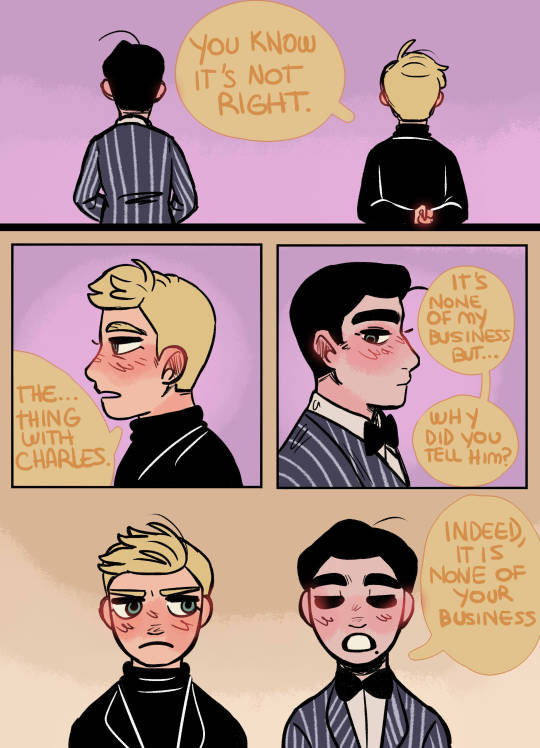
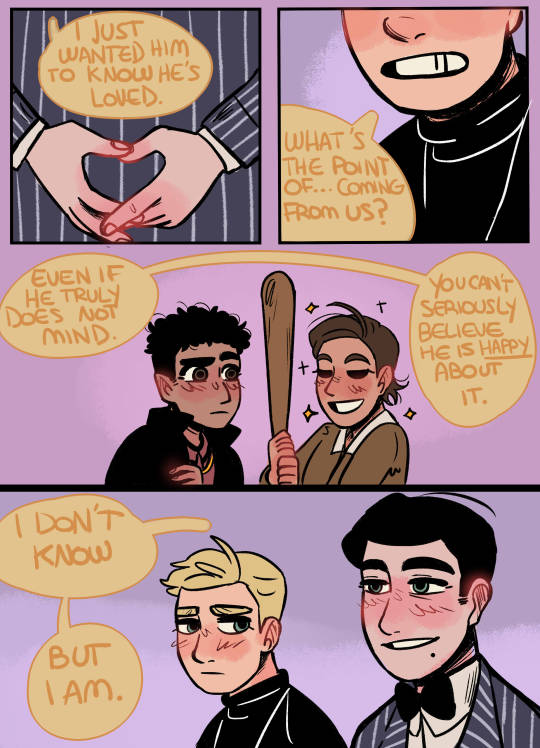
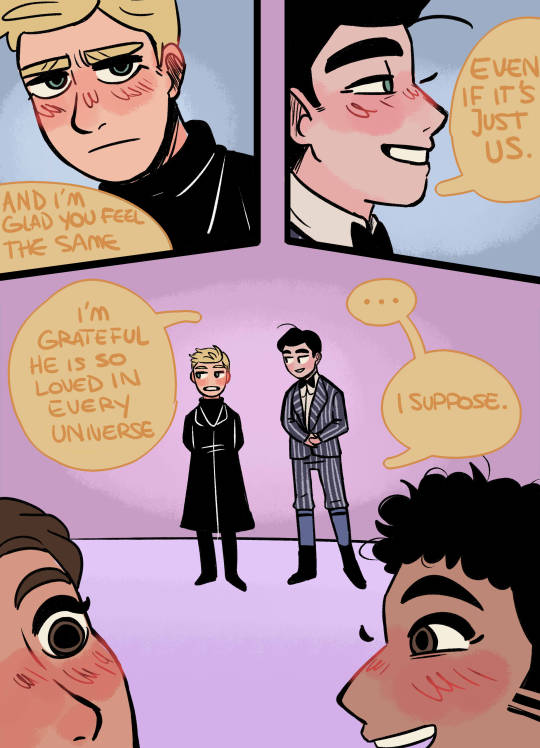
Glad you asked
ko-fi
#ask ask ask#dead boy detectives#dbda#payneland#edwin x charles#doom patrol#dead patrol#cw homophobia#i know there are a couple of people who enjoy my rambly tags so these are for u#first of all anon i'm sorry i used your request to continue my story lol#most of my comics are meant to be standalones BUT#the doom patrol and dead girl detectives are all happening in the same universe#and there is indeed series of events here!#this particular one is happening after dp!edwin's feelings were exposed but before they met the girls#with that out of the way#i know this is not as funny as most of my stuff#but dp!edwin's internalized homophobia is an important thign that can't just go away because his charles loves him back#and he does love him back! in this verse#dp!charles is the only one not struggling with his feelings for his partner#dbd!charles and charlotte still have ways to go#also dbd!edwin is in no way an expert in self-acceptance but he has learned some things#i considered having him mention simon but i decided it wasn't his place to out him#(even though he's dead u know)#so yeah what he says here isn't... great#he's still putting himself down and he's still not sure if his feelings for charles are actually a good thing#but he knows HE is glad he feels this way#because fuck it it's not like he'll go to hell for it#and even if he did... he would crawl his way out
1K notes
·
View notes
Text
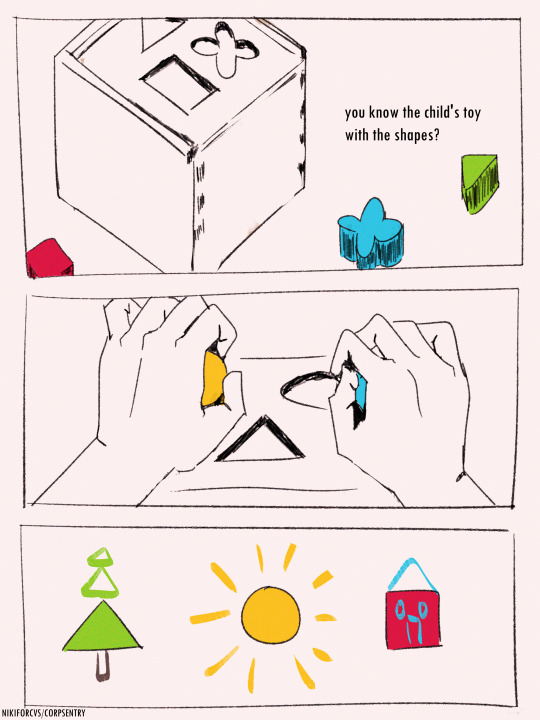
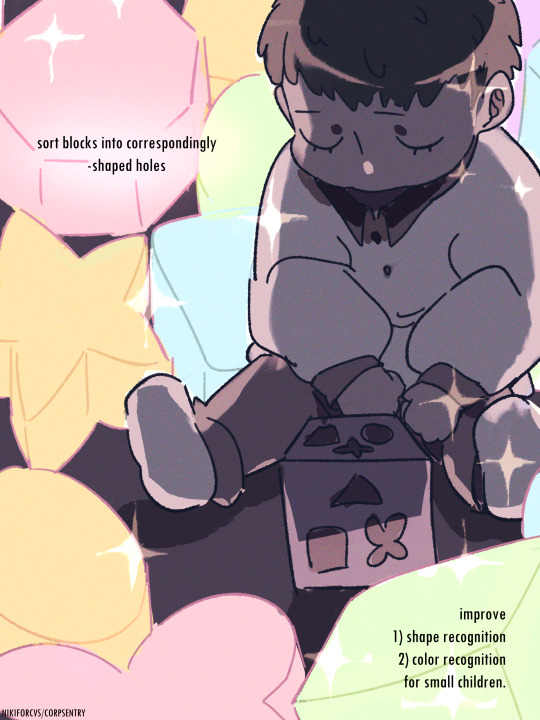
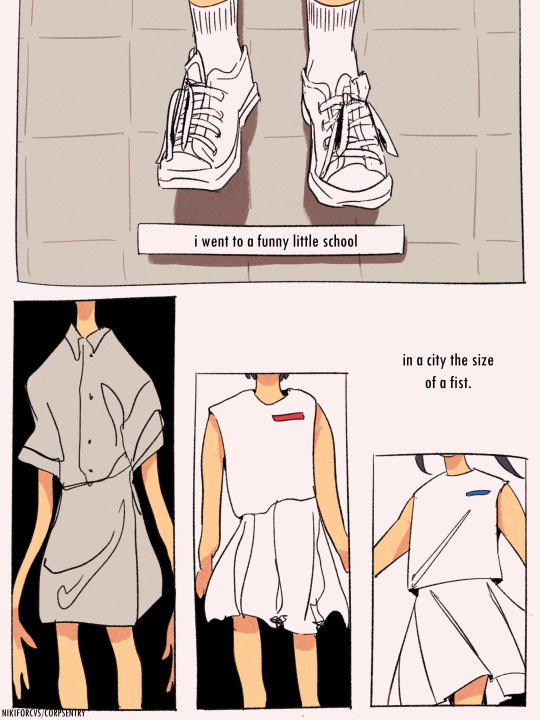
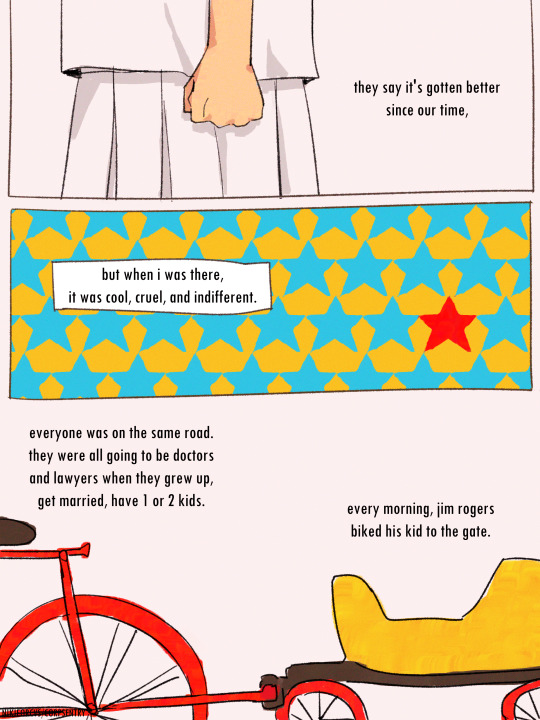
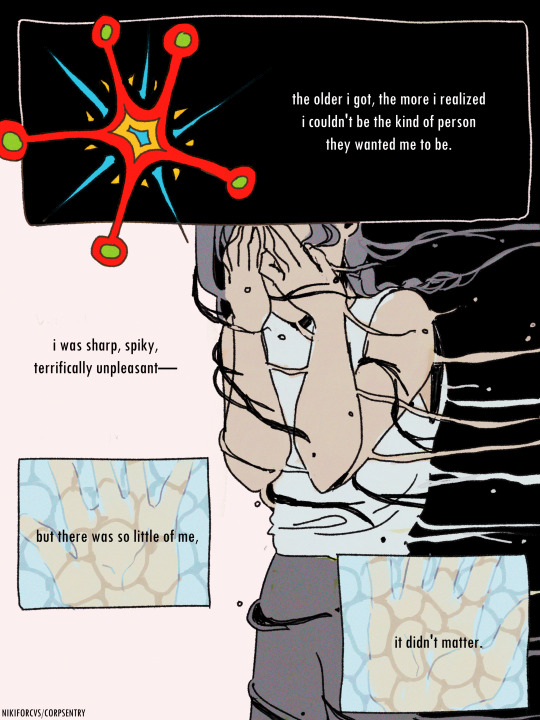


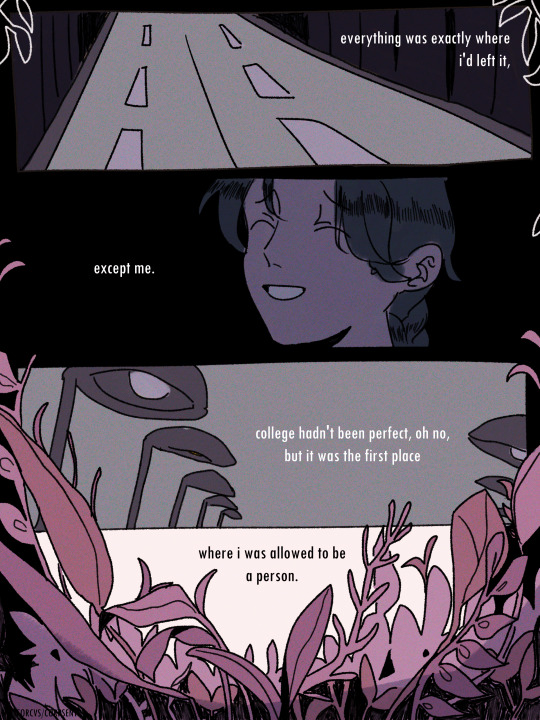

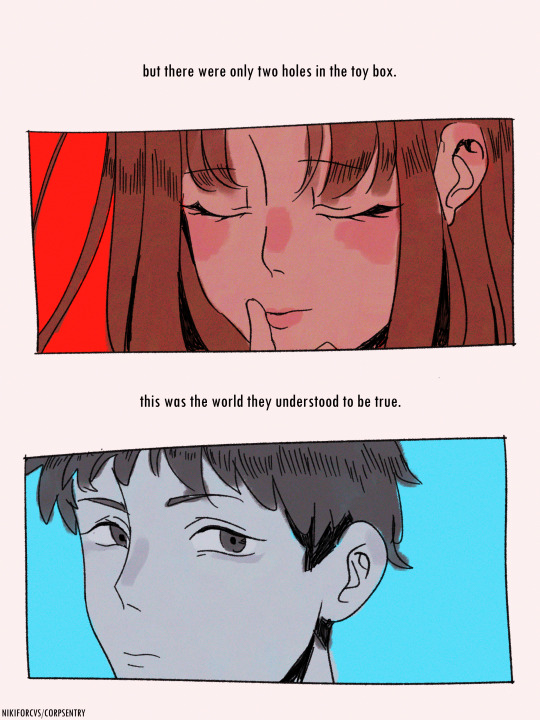
a glass sun 1/2
#my art#my stuff#this is really fucking long so im gonna have to break it up into multiple reblogs#(howling) WAUGHHHHHHH#i love aishang by xiaoshiguniang#i love to implicate my alma mater in my art about being gay in the shittiest most conservative corner of singaporean society#by some terrible trick of fate i ended up in the conservative chinese christian cishet circuit from primary school to end of hs#obviously i am not most of these things but there i was. Depressed#and there i was after that at Liberal Arts College. the 4 years i spent there were a clusterfuck#but like a good and outrageous and lively clusterfuck#and i graduated in may this year and when i came back it was for the first time in 10 months. it was like. what da hell#like i love being here in specific ways but there is also the pain of being seen as something you're not constantly#can i blame them? i ask myself this every day. for most of my ex classmates and relatives i Am the only not cis person they know#idk my lottery number was bad this corner of society really is that bad#and so its like. idk dawg anyway i aint offering solutions but u get it like it fucks with your head to be misgendered either which way 24/#but to leave them behind would be to leave the only people who knew me for the first 19 years behind. and thats a lot of my life#i am 23!!!!!! ough#anyway. whatever. if u liked it i have a ko-fi#reblogos appreciated
1K notes
·
View notes
Text
Introducing our silly httyd ocs!
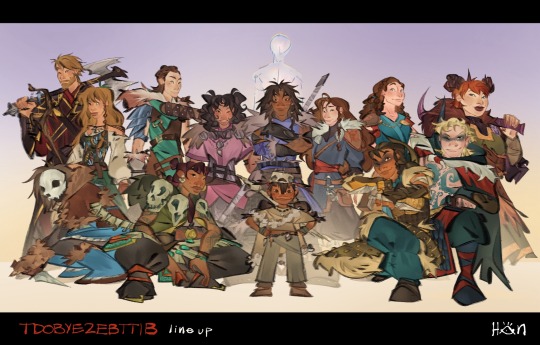
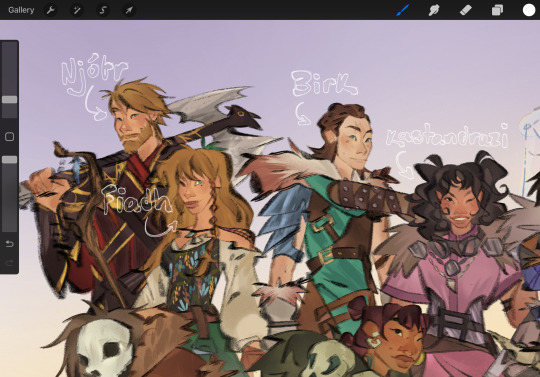


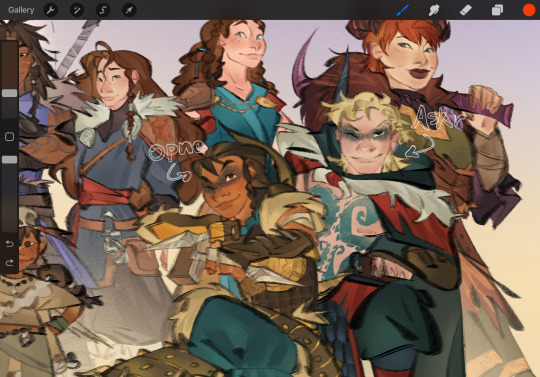

A cute little idea spiraled into 72 pages worth of lore, a plethora of art, animatics, blurbs, and brainrot. We are so normal about all of them.
Here’s the *cast:
Hilditonn (Hildi), she/her - @midoristeashop
Lodinhofdi (Loafie), she/he - @jackshiccup
Klaufi, she/her - @vindikaetion
Tafi, (she/her) - @secretsivekept
Rowan, (she/her) - @bignostalgias
Opna, (they/them) - @alkalinefrog
Njótr, (he/him) - @santathegrey
Askr, (he/him) - @jjackfrost
Birk, (he/him) - @yanleafy
Kastandrazi (Drazi), (she/her), - @droptoposmosis
Katla, (any) - @hawwokitty
Fiadh, (she/her) - @sweeetcheeese
[redacted] - @twiafom
*bolded names are what we use the most for them lol
Anyway get ready for content
#han here#if u know us from hijack island no you don’t#this is a cool lil project we’ve been working on for a while#!!!!!#we have many things to share#tdobye2ebttib#yeah believe it or not that is not a keysmash#httyd sona#httyd#httyd oc#WE ARE FINALLY FREE#um if anyone asks questions abt them done be shy#tdob#this all came from a thought of “wouldn’t it be so funny if we drew ourselves in httyd universe#the delinquents of berk
351 notes
·
View notes
Text
"you're always the car crash ronan" of course he is!! what else could he possibly be? he's an ancient being shrunken down and shoved into the body of a gay 18 year old boy yet still left with the capacity to feel the full intensity of every human emotion imaginable in it's entirety and create things beyond comprehension without the knowledge of why or how or most importantly what for. one day he wakes up to find the family he depends on to give him a place in this world shattered and broken at his feet and has nowhere to go and he can't go home. he's a fast car on a closed track... what else is left for him to do but spin out???
#mentioned I was holding this in my drafts and someone asked after it..... here u go!!!!!#i probably would have held it longer to shape and edit it more but I've had this for over a year and the ppl asked so they receive#one thing abt me over here at kazbiter is I will talk abt anything if u encourage me to do so#this mouth does not stop running!!!!#anyways yeahhhhhhhh ronan I love u#ronan lynch#the dreamer trilogy#the raven cycle
563 notes
·
View notes
Note
sellllllll it's meeeeee. hehehehehehehehehhehe
so for ur writing exercises.... deku + light? please? pretty please?
:3c
heheh heheh hehe niku. this will be the death of me. me writing izuku for the first time 🥲 i will only do this for you </3
contains: established relationship, spoilers for the end of the manga, aged up deku but sometime in between the final outcome (he doesn't get the h*** s*** from bakugo yet), mentions of sex and scars
deku + light
izuku only sleeps with the lights off.
it isn't uncommon; many people you know can't sleep with even just a sliver of light turned on somewhere in the room. but the difference with izuku, you learn, is not that he's unable to stand the light―it's that he refuses to.
you quickly pick up on it the first few times he sleeps over.
he fidgets in bed, pretty badly, actually. the nightlight you sleep with glows a warm yellow, illuminating the side of your face and coating him in its afterglow. you chalk it up to nerves, how he pulls at his sleeves and adjusts his position constantly; he is, after all, one of the most anxious people you know.
and this relationship―it's new. heck, even you feel a little jittery with his arm wrapped around you.
the rhythmic tapping on your hip only increases pace. you don't think he realizes it, so your hand gently reaches for his, intertwining your fingers as you turn around in his arms.
he's close, nearly touching you nose-to-nose; the proximity leaves you fuzzy, a little ticklish, so you giggle, a soft "oops," as the freckles dusting his face almost glisten under the warm light.
"hi," you whisper, meeting his eyes; they stare back at you wide in surprise, "can't sleep?"
he looks almost guilty at your question, as if you’ve caught him with the one thing he's been trying to keep from you.
"just—" his voice comes out louder than intended, prompting him to chuckle nervously as he readjusts his volume, "just winding down, sorry."
you inch closer, nuzzling his nose lightly, "it's okay."
"did i wake you?" he asks, cheeks flushing pink as his eyebrows furrow in immediate concern. his expression is something caught between stifling a grin and feeling sorry.
you shake your head against the pillow you share, strands of your hair tangling with his. "just winding down," you tease, watching as his gaze turns softer, eyelids drooping heavier.
sometimes, you think, izuku holds the world in his eyes―a deep, dark green, the color of life. most times, they look at you with wonderment, bright and alive; photos from inko tell you they're the eyes of his inner child.
on nights like this one, however, they hide a depth in them weighted by what you can only assume is time, and all that has happened to him in such a short span of it.
you try your best to understand what lies beneath them, knowing full well he'll never tell you outright what truly bothers him.
"is it the light?" you bring up, some time after laying in silence.
"hm?" he clarifies.
"do you have a hard time sleeping with the nightlight?"
his eyes widen briefly once more, as if shocked that you've caught him again. these split second reactions are ones you've learned to be attentive to when it comes to izuku.
"no," he tries to lie, but you know better as you turn to your nightstand and reach for its switch, "you don't–"
"it was hurting my eyes," you quickly make up an excuse, tucking yourself closer under his chin as you cut off his attempt to deny it again.
finding out that the light was the problem was the easy part—
you'd begun to notice much earlier on that izuku was barely rested on the nights he'd spend at your place. it was only when your old nightlight broke that you began to notice him waking up much later than you did, groggily rousing from a deep sleep.
—what was hard, was figuring out why.
at first, you suspected it was his scars.
"s-sorry, it's not—" he'd warned you, right as your hands gripped the hem of his shirt the first time you were about to have sex, "—it's not nice."
you didn't care though; you still don't care, and you've made that abundantly clear to him since. you love izuku and all his parts―all the nicks and jaggedy pieces of skin that make up who he is.
when you eventually ask him about it, with a request that he be honest with you for once, he tells you that it is and it isn't―the reason why he exclusively sleeps with the lights off, that is.
it's an odd, comforting relationship he has with his body—that he is simultaneously grateful and sorry for how its become a canvas, both painted and marred to symbolize japan’s historic last stand.
you find out the real reason when you catch him staring at his hands.
he does it often, when he thinks you aren't looking—his fists bunched up in the same way he used to watch the power of one for all course through his fingertips; the same way he used to prepare them in battle.
there’s a faraway look in his eyes that lingers, you notice—a little wistful if anything.
“do you miss it?” you finally ask. he gives you the same shocked look he does every time, as if he’s been caught with a secret he’s been trying to hide.
he’s learned a fair bit about you now, too, though—lying to you is futile when you’ve perfected reading his truth. he stares at his fists again as you take a seat beside him, moving to give you space. you rest your head on his shoulder gently, waiting.
“sometimes,” he admits, but you know it’s an understatement.
“i think about the vestiges a lot. i miss them the most, i think,” he continues, clenching his fists tightly, “i always try to reach out to them, but i guess it doesn’t work that way.”
“i… i try to replicate the right conditions every night, but…” then he lets go, stretching his fingers out wide. the scars on the surface ripple through his skin, telling its own story.
you hum, acknowledging what he means. silence sits with the two of you as you take his hand in yours, slowly unfurling his fingers until his palm reveals itself to you. it’s rough to the touch, seasoned with hard work and all that he’s been through.
“is that why you prefer the dark?” you ask softly, after some time.
it's not often that you stay up later than izuku does. when you do though, you catch him shifting in bed, moving from side-to-side. you pretend you aren't awake, but you hear him mumble their names, dwindling in volume as he dozes off to sleep.
he stares at his palm for a moment before he admits quietly, "yeah." his brows furrow as if contemplating whether to say more, but he shakes his head, dark green strands swaying to the beat of his embarrassed chuckle, "nevermind, it's silly."
"it's not."
you intertwine your fingers, sandwiching his hand between yours. a slight sheen glosses over his eyes as he tilts his head up to look at you. he draws in a breath, before it spills over.
"it's..." he finds the words, and you squeeze his hand in comfort, "it's easier to believe it was all real when the lights are out, and that maybe it can happen again."
#deku x reader#izuku x reader#midoriya x reader#bnha x reader#shotorus.workbook#it is here ! the first time ive ever written izuku ! i hope u like it niku !#idt i'll ever feel like anything i write of him will be enough but i tried !#SPOILERS FOR MANGA ENDING PLS DONT READ AHEAD#some stuff abt the blurb: i see this happening in the time between him losing ofa and before getting the suit from bakugo#so somewhere between when hes teaching#and i think its a lot of complex feelings ― he's happy he did what he had to do but is also mourning the loss of something he once had#i don't think i can ever convey that feeling fully but i hope i at least managed to touch on it here with him !#i see this as like . the period in his life where he's transitioning out of something he once knew into smth else entirely#i also hc reader to be his colleague (like a teacher or smth) but anyone closely related to the job would work !#really just someone who has a base level understanding of what he went through but doesnt know everything#which is why they're still trying to learn all these things abt him and read him better#and also why he tries to hide a lot of things from them still / is hesitant to share in fear of scaring them away smth like that !#thats all i can think of for now but ill let u know if i have other thoughts on this later on ! hehe#hope u enjoy niku !#ask#rep#ask game answered#most nervewracking experience of my LIFE writing him#stellamancer#niku.🥩
179 notes
·
View notes
Note
https://www.tumblr.com/girlsdads/762007245755170816
It looks like daniel is peeing
em!!! you put this in my brain and i promptly had a crisis, so of course i had to give Max that same crisis, and somehow this became 1.3k 🫡
cw: (consensual?) voyeurism, romanticized peeing
Practice gets red-flagged early on. Max doesn’t see who is in the barrier as he slowly passes, just knows it isn’t Daniel. He’d been assured of that down his radio almost instantly, though he hadn’t asked. He thinks it must be team protocol to tell him this, that it’s not his teammate in the totaled car. Still, Max flushes bone-deep, feeling too exposed, too obvious. Feeling like they know, everyone must know, his brain turns to goop around Daniel and he never catches himself in time.
He trails Daniel to his driver’s room anyway, knowing how it looks. Daniel grins over his shoulder at Max, starts skipping ahead, makes Max chase him. Warmth blooms in Max’s belly. He may be always following behind Daniel, but Daniel is always looking back.
Daniel shrugs his race suit off his shoulders, lets it hang open around his trim waist. The humidity has stamped dark patches on his white fireproofs where he’s started to sweat through. Max closes the door behind himself and stands there awkwardly, trying to think of something to say that will make Daniel laugh, trying not to make direct eye contact with Daniel’s sweaty armpits, lest he shove Daniel against the wall and stick his nose there.
What happens instead is much, much worse.
Daniel is making a beeline to the bathroom, thumbs hooking into the elastic over his flat pelvis. Max’s vision tunnels, the air in the room seeming to close in around him with a swoosh.
“What are you doing?” He hears himself ask, stupidly.
It’s obvious what Daniel is doing. He’s shimmying his hips side to side as he nears the toilet, wiggling the Nomex down. He’s left the door wide open. He stops and smiles at Max, blinding. “Gotta drain the snake, as they say.”
Who is saying this other than you, Max wants to shoot back, knows he should match Daniel’s cheeky tone, rib him a little then leave the fucking room like a normal person. He hears the wet pop of his own bottom lip dropping open, feels the weight of the words against his larynx, but is struck completely dumb watching Daniel pull out his flushed, soft cock.
Max has of course seen Daniel’s dick before, it would probably be more weird if he hadn’t, like he was purposely trying not to. But the handful of other times have only been glimpses in his periphery, nothing like this. Like this, close range and staring openly because Daniel knows Max is there and still he didn’t close the door, Max can see everything.
The double-stacked waistband of his briefs and fireproofs is tucked up snug under his balls. Max can see where the dark, stubbly hairs are starting to grow back, on his sac and around the base of his cock. Daniel has joked before, about manscaping, but to see the evidence of it like this is dizzying. Max wants to go to his knees and pull each ingrown hair free with his teeth.
Daniel holds himself loosely in his left hand, the ruddiness of his shaft clearly visible through the gaps between knucklebones. The head is peeking out past the circle of his index finger and thumb, fat and flushed a little darker than the rest of him. Even soft, his cock looks heavy and full. Max’s mouth floods with saliva and he sucks it back with his cheeks pinched in, hoping Daniel won’t hear the wet slurp.
His skin feels hot. He’s stuck like an ant under a magnifying glass in the sun, his insides incinerating as he watches an arc of piss flow from the gorgeous tip of Daniel’s cock, noisily splashing into the bowl.
Daniel groans, his chin bobbing down toward his chest like someone cut the string that was holding his head upright. Piss hisses out of him, harder now, like he’s pushing it. It is so loud and the walls are thin—anyone lingering nearby must be able to hear, to know. Max wishes he could put up a forcefield, shelter them both inside where only Max can hear the sounds Daniel’s body makes.
It is all over so quickly. The stream trickles to a stop and then Daniel is shaking off the last little dribbles before he’s tucking himself away. Max feels a pang in his chest like grief—he hadn’t finished mentally cataloguing every angle of this moment, needs the image 3D printed into his brain so he can remember forever. Daniel will probably never speak to him again after this, will certainly not let Max anywhere near his bare cock once he turns and sees—Max is hard.
Daniel is shrugging back into the shoulders of his race suit and Max is standing there tenting his own, mortifyingly obvious. Max braces for whatever awkward joke Daniel will try to make to mask his disgust, as he faces Max finally.
He watches Daniel notice. He watches his eyes go slightly bigger and rounder, watches his jaw tick like he’s going to drop it. His gaze feels like a physical weight. Max’s dick throbs once, twice. There is no way Daniel cannot see.
Daniel says nothing, in the end. He smiles at Max, easy as anything, as if Max isn’t a complete freak of nature with a boner from watching his teammate take a piss. He even claps Max on the shoulder as he passes on his way out the door, doesn’t seem to catch how Max sways, knees wobbly, under his touch.
And then Max is alone in Daniel’s driver’s room. Alone and hard and—fuck, a realization burns through him—Daniel didn’t flush.
Max lurches forward before he can stop himself. His foot catches on some part of the floor and he stumbles, nearly going to his knees right there in front of the toilet.
It should be mostly clear, with how they are supposed to be staying hydrated, but apparently Daniel is not doing a very good job. Max has to steady himself with one hand on the wall as he stares down into the bowl, dazed. The water is tinged an unmistakable yellow. It hits Max viscerally, that Daniel has bodily functions and that he did one of those right in front of Max, was comfortable enough to not care if he saw. It’s unbearably intimate in a way that Max can’t think too hard about or he’ll forget how to drive his car, probably. He thinks, wildly, that he wishes he could live inside Daniel’s body, surrounded by all the microscopic things that make him him. He wants to kiss every single one of Daniel’s cells and thank them for keeping him alive.
Even more wildly—he wants to massage his bladder from the inside, tell it he’s sorry it had to get so full, that Daniel should never have to hold it for too long, that he could always if he cannot wait tell Max to go to his knees, and Max would, anywhere, tip his head back and open up for everything Daniel has to give—
Max rips his layers off, feeling frenzied. Elastic stretches around his thighs as he squats lower, his cock now leaking bare over the bowl full of Daniel’s pee. He had foregone underwear earlier, the crotch of his fireproofs now absolutely soaked through with precome. It will be cold and sticky around his cock and balls when he gets back in the car, he will have to drive again and feel it and he will think about Daniel and his dehydrated piss and the sound he made when he let go—
Max comes, shaking, aiming his cock so that it splatters into the bowl, milky white swirling with yellow. Max and Daniel together, like it should be always.
#ask#maxiel#my fic#if there’s one thing about me… i Will make peeing about The Yearning#em thank u for always fueling my freaky little mind 😈#started writing this before The Horrors and got derailed for a bit but we’re back!#also ik the reference pic is from singapore 2016 but nothing in this is based on the actual events of that gp 👍#don’t come in here expecting journalistic integrity#also also tried to proofread this but i’m suuuuuper stoned rn so fuck it we ball
146 notes
·
View notes
Text
the problem is that being single is seen as the consolidation prize, and not the natural neutral state of being-a-person. at the end of the movie or the book or the poetry, there is a person waiting for you at the altar, and they love you. if the play is a comedy, everyone gets married. the metaphor is about how you are not-whole. the metaphor is about how everyone is going to be happily-ever-after. the metaphor is that romantic love is the most important resource on the planet, not just all-love. all-love is not a thing, that is a disappointment. the treasure is not the friends we made along the way. the treasure is the girl you landed.
the metaphor is that you cannot be alone, that means you are broken. are you getting over someone? that is acceptable, you can be getting over someone, but not for long. you must be single because you would rather not be single. you must be single and looking to not-be-single. you must want to date, eventually.
friendship and community are never seen as being equal-to or even-better than romantic connection. that person is your one! you need to find them. you need to hunt through the sand particles until you can shift out some kind of gem. this is regardless to your own experience of the beach and the sun. you need to be somewhere with someone.
if you are taking this time alone to heal, that is so sad. everyone gives you this little pitying look. the understanding is that you are not actually happier than you were before you were single. it is seen as a sort of pity - oh, you are choosing yourself, making yourself the priority? - that isn't quite right. you must mean that you are making yourself ready for the right person. you are just laying the bed better this time. open up your heart. you'll find them, we promise!
what do you mean you're really-truly genuinely-very happy? you are probably misremembering what it was like to be in a relationship. and besides, once you meet your person, that time will look grey and bland and wasted. your person is the only way for you to see in color. so what if you have taken this time - for the first time in your entire life - to actually-for-real do the fucking work. you can be proud of yourself, sure. but the way we need to know that you got better is that you get a partner. you're healed enough for the next bad part!
people don't choose to be single, they just say they're choosing to be single - they actually mean "nobody wants to date me." it doesn't matter how many people you have gently rejected or how many times you've talked it over carefully in therapy. what matters is that you are single, and by all accounts - that means you are something worth our pity. your successes and life all seem pale in the sunlight. sure, you have done amazing things and finally found your way in life. what matters is that there wasn't a person in the room with you while you did it.
you want to tell them - that's the whole thing. i didn't know how to be alone in the room. i didn't know how to handle the silence. every moment was so sharp, and i kept choosing the wrong way to close the door. i have spent my entire life in the empty well, living in the ricochet of someone else's cruelty. for once i have built myself a ladder. for once everything i taste is all mine, every bite of sunshine and laughter. i have learned how to sleep out in the open with my memories. recently, they have started to purr.
your father rolls his eyes. listen. this isn't about you. i just want a grandchild in my future.
#writeblr#i actually didn't want a girlfriend before nat#and my dad recently said to me - raquel. i don't approve of the promiscuity#1. i am 30.#2. i had casually dated about 4 people over 18 months.#3. i do believe he was just mad that i get more girls than he ever did#i had to look this 60 yr old deacon in the eye and say. okay so i have a girlfriend first of all im just not tellin yall about her#and secondly.#OKAY???? OLD MAN I DONT EVEN LIVE HERE WHAT ARE U GONNA DO ABOUT IT#briefly considered asking nat if i could pretend we were a one night stand kind of a thing
4K notes
·
View notes
Note
Sorry for the spam (^o^;) I just really like your blog
no need to apologize ayy!
in this corner we welcome all forms of enjoyment, regardless of whether you're a

happy to have yall here w me,
headin into homestuck 2024 :^)
#was debating if sollux truly was lurker type but then i rmbr'd him quietly reading all of karkat's memos for a good laugh HAHAHAHAAH#ask#aleemie#homestuck#karkat vantas#sollux captor#solkat#2024#vioart#but o. regarding the etiquette learned frm other socmed#spamming here is safe+good! it does not harm the op by shadowbanning like instagram#and its not 💀 like twitter where ur likes/following are permanently set to public#ur tumblr experience is within ur control it can be as free/empty/curated as u want!!#((tho ofc i do encourage rbing for ppl who've been hoping to start that habit!!#s'cool to slowly work ur way up from the extra special posts that hv lingered longest in ur heart and quietly build ur cache trove :-)#for example back when i was struggling to rt on a new twt acc i just started setting nonsense criteria for myself LOL#like “breaking this void is scary holy fuck ok i shall start by rting posts w brownish/reddish clrs bcs its inspo vibes for my art”#and gradually after a while of deliberate sharing i gained more confidence to share a larger variety of posts that make me feel things!!!!#no more training wheels i may be scared but i love loving more!!!!#same goes for engaging w fics too it takes energy to think of how to comment and thats ok‚ do ur best to explore what works for u!!!!#take screenshots of ur fave paragraphs & start annotating in gallery/notes app if that helps!!!!#also tumblr's customizable queue means u can stack posts and bolt hgehehe. my preferred form of existing on the net))
1K notes
·
View notes
Note
Inspired by one of you previous arts, do you think L and Light both bite each other’s lips, or does Light only bite L’s?



Anon, this question really made me think. So much so I had to put pen to paper. And I think I’ve decided that in classic lawlight fashion they both are biters, but their executions are where the similarities end.
#thank you for the ask!#I was thinking to myself like oh you fucking KNOW L would be a bitey little thing#I think I personally take much joy out of the whole cherry stem oral fixation bits in the source material#and would imagine that L’s bites are equally like shows of dominance#but where light in my head is like more of a showman with his sadism I think L would bite in the way one would tug on a dogs leash#like ah ah ah tsk tsk bite bite bite#am I making sense#no#bazpangoart#death note#l lawliet#lawlight#light yagami#this has been in my scheduled queue for a good week#but I needed to jump in here and say big oof and big hugs to my American friends#Will draw as much copium as u need bbs
138 notes
·
View notes
Text
Double Indemnity, Veritas Ratio and Aventurine

This was originally a part of my compilation post as a short analysis on the Double Indemnity references, linking to this great thread by Manya on Twitter. However, I've recently watched the movie and found that the parallels run much deeper than just the mission name and the light cone itself, plus as the short synopsis I've read online. Since there isn't really an in-depth attempt at an analysis on the film in relation to the way Aventurine and Ratio present themselves throughout Penacony, I thought I'd take a stab at doing just that. I will also be bringing up things from Manya's thread as well as another thread that has some extra points.
Disclaimer that I... don't do analyses very often. Or write, in general — I'm someone who likes to illustrate their thoughts (in the artistic sense) more than write. There's just something about these two that makes me want to rip into them so badly, so here we are. If there's anything you'd like to add or correct me on, feel free to let me know in the replies or reblogs, or asks. This ended up being a rather extensive deep dive into the movie and its influences on the pairing, so please keep that in mind when pressing Read More.
There are two distinct layers on display in Ratio and Aventurine's relationship throughout Penacony, which are references to the two most important relationships in the movie — where they act like they hate/don’t know each other, and where they trust each other.
SPOILER WARNING for the entire movie, by the way. You can watch the film for free here on archive.org, as well as follow along with the screenplay here. I will also be taking dialogue and such from the screenplay, and cite quotes from the original novel in its own dedicated section. SPOILER WARNING for the Cat Among Pigeons Trailblaze mission, as well.

CONTENT WARNING FOR MENTIONS OF SUICIDE. YOU HAVE BEEN WARNED.
To start, Double Indemnity (1944) is a film noir by Billy Wilder (and co-written by Raymond Chandler) based on the novel of the same name by James M. Cain (1927). There are stark differences between the movie adaptation and the original novel which I will get into later on in this post, albeit in a smaller section, as this analysis is mainly focused on the movie adaptation. I will talk about the basics (summaries for the movie and the game, specifically the Penacony mission in tandem with Ratio and Aventurine) before diving into the character and scene parallels, among other things.

—
[THE NAME]
The term "double indemnity" is a clause in which if there’s a case of accidental death of a statistically rare variety, the insurance company has to pay out multiple of the original amount. This excludes deaths by murder, suicide, gross negligence, and natural causes.

The part of the mission in Cat Among Pigeons where Ratio and Aventurine meet with Sunday is named after the movie. And before we get further into things, let's get this part out of the way: The Chinese name used in the mission is the CN title of the movie, so there's no liberties taken with the localization — this makes it clear that it’s a nod to the movie and not localization doing its own thing like with the mission name for Heaven Is A Place On Earth (EN) / This Side of Paradise (人间天堂) (CN).

—
[SUMMARY OF THE 1944 MOVIE]
Here I summarised the important parts that will eventually be relevant in the analysis related to the game.

Insurance salesman Walter Neff, wounded from a gunshot, enters his office and confesses his crime on a dictaphone to his boss Barton Keyes, the claims manager. Much earlier, he had met Phyllis Dietrichson, the wife of Mr. Dietrichson and former nurse. Neff had initially wanted to meet Mr. Dietrichson because of car insurance. Phyllis claims her husband is mean to her and that his life insurance goes to his daughter Lola. With Neff seduced by Phyllis, they eventually brew up a scheme to murder Mr. Dietrichson in such a way that they activate the "double indemnity" clause, and the plan goes off almost perfectly. Initially, the death is labeled a suicide by the president of the company, Norton.
Keyes finds the whole situation suspicious, and starts to suspect Phyllis may have had an accomplice. The label on the death goes from accidental, to suicide, to then murder. When it’s ruled that the husband had no idea of the accidental policy, the company refuses to pay. Neff befriends Phyllis’ stepdaughter Lola, and after finding out Phyllis may have played a part in the death of her father’s previous wife, Neff begins to fear for Lola and himself, as the life insurance would go all towards her, not Phyllis.
After the plan begins to unravel as a witness is found, it comes out that Lola’s boyfriend Nino Zachette has been visiting Phyllis every night after the murder. Neff goes to confront Phyllis, intending to kill her. Phyllis has her own plans, and ends up shooting him, but is unable to fire any more shots once she realises she did love him. Neff kills her in two shots. Soon after telling Zachette not to go inside the house, Neff drives to his office to record the confession. When Keyes arrives, Neff tells him he will go to Mexico, but he collapses before he could get out of the building.
—
[THE PENACONY MISSION TIMELINE]

I won’t be summarising the entirety of Aventurine and Ratio’s endeavours from the beginning of their relationship to their final conversation in Heaven Is A Place On Earth the same way as I summarised the plot of the movie, so I will instead present a timeline. Bolded parts means they are important and have clear parallels, and texts that are in [brackets] and italics stand for the names of either the light cone, or the mission names.
[Final Victor] Their first meeting. Ratio’s ideals are turned on its head as he finally meets his match.
Several missions happen in-between their first encounter and the Penacony project. They come to grow so close and trusting with each other that they can guess, understand each other’s thoughts, way of thinking and minds even in high stakes missions. Enough to pull off the Prisoner’s Dilemma (Aventurine’s E1) and Stag Hunt Game (Aventurine’s E6) and come out on top.
Aventurine turns towards Ratio for assisting him in the Penacony project. Ratio's involvement in the project is implied to be done without the knowledge of Jade, Topaz, and the IPC in general, as he was only sent to Penacony to represent the Intelligentsia Guild, and the two other Stonehearts never mention Ratio.
Aventurine and Ratio cook up the plan to deceive Sunday before ever setting foot on Penacony. Aventurine does not tell Ratio the entirety of his plan.
Aventurine convinces Topaz and Jade to trust him with their Cornerstones. Aventurine also breaks his own Cornerstone and hides it along with the jade within a bag of gift money.
[The Youth Who Chase Dreams] They enter Penacony in the Reverie Hotel. Aventurine is taken to the side by Sunday and has all his valuables taken, which includes the gift money that contains the broken aventurine stone, the jade, and the case containing the topaz.
Aventurine and Ratio speak in a “private” room about how Aventurine messed up the plan. After faking an argument to the all-seeing eyes of Sunday, Ratio leaves in a huff.
Ratio, wearing his alabaster head, is seen around Golden Hour in the (Dusk) Auction House by March 7th.
[Double Indemnity] Ratio meets up with Sunday and “exposes” Aventurine to him. Sunday buys his “betrayal”, and is now in possession of the topaz and jade. Note that this is in truth Ratio betraying Sunday all along.
Ratio meets up with Aventurine again at the bar. Ratio tells Aventurine Sunday wants to see him again.
They go to Dewlight Pavilion and solve a bunch of puzzles to prove their worth to Sunday.
They meet up with Sunday. Sunday forces Aventurine to tell the truth using his Harmony powers. Ratio cannot watch on. It ends with Aventurine taking the gift money with his Cornerstone.
[Heaven Is A Place On Earth] They are in Golden Hour. Ratio tries to pry Aventurine about his plan, but Aventurine reins him in to stop breaking character. Ratio gives him the Mundanite’s Insight before leaving. This is their final conversation before Aventurine’s grandest death.
Now how exactly does the word “double indemnity” relate to their mission in-game? What is their payout? For the IPC, this would be Penacony itself — Aventurine, as the IPC ambassador, handing in the Jade Cornerstone as well as orchestrating a huge show for everybody to witness his death, means the IPC have a reason to reclaim the former prison frontier. As for Ratio, his payout would be information on Penacony’s Stellaron, although whether or not this was actually something he sought out is debatable. And Aventurine? It’s highly implied that he seeks an audience with Diamond, and breaking the Aventurine Cornerstone is a one way trip to getting into hot water with Diamond. With Aventurine’s self-destructive behaviour, however, it would also make sense to say that death would be his potential payout, had he taken that path in the realm of IX.
Compared to the movie, the timeline happens in reverse and opposite in some aspects. I will get into it later. As for the intended parallels, these are pretty clear and cut:
Veritas Ratio - Walter Neff
Aventurine - Phyllis Dietrichson
Sunday - Mr. Dietrichson

There is one other character who I feel also is represented in Ratio, but I won’t bring them up until later down the line.
For the sake of this analysis, I won’t be exploring Sunday’s parallel to Mr. Dietrichson, as there isn’t much on Dietrichson’s character in the first place in both the movie and the novel. He just kind of exists to be a bastard that is killed off at the halfway point. Plus, the analysis is specifically hyper focused on the other two.
—
[SO, WHAT’S THE PLAN?]
To make things less confusing in the long run whenever I mention the words “scheme” and “plan”, I will be going through the details of Phyllis and Neff’s scheme, and Aventurine and Ratio’s plan respectively. Anything that happens after either pair separate from another isn’t going to be included. Written in a way for the plans to have gone perfectly with no outside problems.

Phyllis and Neff —> Mr. Dietrichson
Goal: Activate the double indemnity clause by killing Mr. Dietrichson and making it look like a freak train accident
Payout: Twice or more of the face value of the life insurance ($100,000)
Main Actor: Walter Neff | Accomplice: Phyllis Dietrichson
During the entire time until the payout, Phyllis and Neff have to make sure to any outsiders that they look like complete strangers instead of lovers in an affair.
Step-by-step:
Neff convinces Mr. Dietrichson to sign the policy with the clause without him suspecting foul play, preferably with a third party to act as an alibi. This is done discreetly, making Mr. Dietrichson not read the policy closely and being told to just sign.
Neff and Phyllis talk to each other about small details through the phone (specified to be never at Phyllis’ own house and never when Neff was in his office) and in the marketplace only, to make their meetings look accidental. They shouldn’t be seen nor tracked together, after all.
Phyllis asks Mr. Dietrichson to take the train. She will be the one driving him to the train station.
On the night of the murder, after making sure his alibi is airtight, Neff sneaks into their residence and hides in their car in the second row seating, behind the front row passenger seat. He wears the same colour of clothes as Mr. Dietrichson.
Phyllis and Mr. Dietrichson get inside the car — Phyllis in the driver’s seat and Mr. Dietrichson in the passenger seat. Phyllis drives. On the way to the train station, she makes a detour into an alley. She honks the horn three times.
After the third honk, Neff breaks Mr. Dietrichson’s neck. The body is then hidden in the second row seating under a rug.
They drive to the train station. Phyllis helps Neff, now posing as Mr. Dietrichson, onto the train. The train leaves the station.
Neff makes it to the observation platform of the parlour car and drops onto the train tracks when nobody else is there.
Phyllis is at the dump beside the tracks. She makes the car blink twice as a signal.
The two drag Mr. Dietrichson’s corpse onto the tracks.
They leave.
When Phyllis eventually gets questioned by the insurance company, she pretends she has no idea what they are talking about and eventually storms off.
Phyllis and Neff continue to lay low until the insurance company pays out.
Profit!
Actual Result: The actual murder plan goes almost smoothly, with a bonus of Mr. Dietrichson having broken a leg. But with him not filing a claim for the broken leg, a witness at the observation platform, and Zachette visiting Phyllis every night after the murder, Keyes works out the murder scheme on his own, but pins the blame on Phyllis and Zachette, not Neff.

Now for Aventurine and Ratio. You can skip this section if you understand how deep their act goes, but to those who need a refresher, here’s a thorough explanation:
Aventurine and Ratio —> Sunday
Goal: Collect the aventurine stone without Sunday knowing, ruin the dream (and create the grandest death)
Payout: Penacony for the IPC, information on the Stellaron for Ratio, a meeting with Diamond / death for Aventurine
Main Actor: Aventurine | Accomplice: Veritas Ratio
From the moment they step onto Penacony, they are under Sunday’s ever present and watchful eyes. “Privacy” is a foreign word to The Family. They have to act like they don’t like each other’s company the entire time and feed Sunday information through indirect means so that the eventual “betrayal” by Ratio seems truthful to Sunday. Despite what it looks like, they are closer than one would ever think, and Ratio would never sell out a person purely for information.
Step-by-step:
After Sunday takes away the bag of gift money and box, Aventurine and Ratio talk in a room in the Reverie Hotel.
Aventurine establishes the Cornerstones’ importance, and how he lost the gift money and the case containing the Cornerstones to Sunday. Ratio turns to leave, saying “some idiot ruined everything”, meaning the Cornerstones were vital to their plan. (Note that Ratio is not wearing his alabaster head while saying it to said “idiot”.)
Aventurine then proceeds to downplay the importance of the Cornerstones, stating they are “nothing more than a few rocks” and “who cares if they are gone”. This lets Sunday know that something suspicious may be going on for him to act like it’s nothing, and the mention of multiple stones, and leaves him to look up what a Cornerstone is to the Ten Stonehearts of the IPC.
Ratio points out his absurd choice of outfit, mentioning the Attini Peacock and their song.
Ratio implies that without the aventurine stone, he is useless to the IPC. He also establishes that Aventurine is from Sigonia(-IV), and points out the mark on his neck. To Sunday, this means that Aventurine is shackled to the IPC, and how Aventurine may possibly go through extreme lengths to get the stone back, because a death sentence always looms above him.
Aventurine claims Ratio had done his homework on his background, which can be taken that this is their very first time working together. (It isn’t, and it only takes one look to know that Aventurine is an Avgin because of his unique eyes, so this comment does not make sense even in a “sincere” way, a running theme for the interaction.)
Ratio mentions how the true goal is to reclaim Penacony for the IPC, establishing their ulterior motive for attending the banquet.
Ratio asks if Aventurine went to pre-school in Sigonia after saying trust was reliant on cooperation. Aventurine mentions how he didn’t go to school and how he doesn’t have any parents. He even brings up how friends are weapons of the Avgins. This tells Sunday that the Avgins supposedly are good at manipulation and potentially sees Ratio possibly betraying Aventurine due to his carelessness with his “friends”. Sunday would also then research about the Avgins in general (and research about Sigonia-IV comes straight from the Intelligentsia Guild.)
Ratio goes to Dewlight Pavilion in Sunday’s Mansion and exposes a part of Aventurine’s “plan”. When being handed the suitcase, Ratio opens it up due to his apparent high status in the IPC. He tells Sunday that the Cornerstone in the suitcase is a topaz, not an aventurine, and that the real aventurine stone is in the bag of gift money. This is a double betrayal — on Aventurine (who knows) and Sunday (who doesn’t). Note that while Ratio is not officially an IPC member in name — the Intelligentsia Guild (which is run by the IPC head of the Technology Department Yabuli) frequently collaborates with the IPC. Either Aventurine had given him access to the box, or Ratio’s status in general is ambiguous enough for Sunday not to question him further. He then explains parts of Aventurine’s gamble to Sunday in order to sell the betrayal. Note that Ratio does not ever mention Aventurine’s race to Sunday.
Ratio brings Aventurine to Sunday. Aventurine offers help in the investigation of Robin's death, requesting the gift money and the box in return.
Sunday objects to the trade offer. Aventurine then asks for just the bag. A classic car insurance sales tactic. Sunday then interrogates Aventurine, and uses everything Ratio and Aventurine brought up in the Reverie Hotel conversation and their interactions in the Mansion, as well as aspects that Ratio had brought up to Sunday himself.
Aventurine feigns defeat and ignorance enough so that Sunday willingly lets him go with the gift bag. After all is said and done, Aventurine leaves with the gift money, where the Aventurine Cornerstone is stored all along.
Ratio and Aventurine continue to pretend they dislike each other until they go their separate ways for their respective goals and plans. Aventurine would go on to orchestrate his own demise at the hands of Acheron, and Ratio… lurks in the shadows like the owl he is.
Profit!
Actual Result: The plan goes perfectly, even with minor hiccups like Ratio coming close to breaking character several times and Aventurine being sentenced to execution by Sunday.
This is how Sunday uses the information he gathered against Aventurine:
• Sunday going on a tirade about the way Aventurine dresses and how he’s not one to take risks — Ratio’s comment about Aventurine’s outfit being peacock-esque and how he’s “short of a feather or two”. • “Do you own a Cornerstone?” — Ratio talked about the aventurine stone. • “Did you hand over the Cornerstone to The Family when you entered Penacony?” — Aventurine mentioned the box containing the Cornerstones. • “Does the Cornerstone you handed over to The Family belong to you?” — Aventurine specifically pluralized the word Cornerstone and “a bunch of rocks” when talking to Ratio. • “Is your Cornerstone in this room right now?” — The box in the room supposedly contained Aventurine’s own cornerstone, when Aventurine mentioned multiple stones. • “Are you an Avgin from Sigonia?” —Aventurine mentioned that he’s an Avgin, and Ratio brought up Sigonia. • “Do the Avgins have any ability to read, control, and manipulate one’s own or another’s minds?” — Aventurine’s comment on how friends are weapons, as well as Sunday’s own research on the Avgins, leading him to find out about the negative stereotypes associated with them. • “Do you love your family more than yourself?” — His lost parents. “All the Avgins were killed in a massacre. Am I right?” — Based on Sunday’s research into his background. • “Are you your clan’s sole survivor?” — Same as the last point. “Do you hate and wish to destroy this world with your own hands?” — Ratio mentioned the IPC’s goal to regain Penacony, and Aventurine’s whole shtick is “all or nothing”. • “Can you swear that at this very moment, the aventurine stone is safe and sound in this box?” — Repeat.
As seen here, both duos have convoluted plans that involve the deception of one or more parties while also pretending that the relationship between each other isn’t as close as in reality. Unless you knew both of them personally and their histories, there was no way you could tell that they have something else going on.
On to the next point: Comparing Aventurine and Ratio with Phyllis and Neff.
—
[NEFF & PHYLLIS — RATIO & AVENTURINE]

With the short summaries of the movie and the mission out of the way, let’s look at Phyllis and Neff as characters and how Aventurine and Ratio are similar or opposite to them.

Starting off with Aventurine and Phyllis. Here is where they are the most similar:
Phyllis is blonde and described as a provocative woman. Aventurine is also a blond and eyes Ratio provocatively in the Final Victor light cone.
Phyllis was put under surveillance after Keyes starts figuring out that the so-called accidental death/suicide may have been a murder after all. Similarly, Aventurine was watched by Sunday the entire time in Penacony.
Phyllis never tells Neff how she's seeing another man on the side to possibly kill him too (as well as how she was responsible for the death of her husband‘s previous wife). Aventurine also didn't tell Ratio the entirety of his plan of his own death.
Phyllis puts on a somewhat helpless act at first but is incredibly capable of making things go her way, having everything seemingly wrapped around her finger. Aventurine — even when putting on a facade that masks his true motives — always comes out at the top.
Now the differences between Aventurine and Phyllis:
Phyllis does not care about her family and has no issue with killing her husband, his previous wife, and possibly her daughter Lola. Opposite of that, Aventurine is a family man… with no family left, as well as feeling an insane level of survivor’s guilt.
Really, Phyllis just… does not care at all about anyone but herself and the money. Aventurine, while he uses every trick in the book to get out on top, does care about the way Jade and Topaz had entrusted him with their Cornerstones, in spite of the stones being worth their lives.
Phyllis also uses other people to her advantage to get what she wants, often behind other people's backs, with the way she treats Neff and Zachette. Aventurine does as well (what with him making deals with the Trailblazer while also making a deal with Black Swan that involves the Trailblazer). The difference here is Phyllis uses her allure deliberately to seduce men while Aventurine simply uses others as pawns while also allowing others to do the same to himself.
Phyllis makes no attempt at compromising the policy when questioned by Norton. Aventurine ends up compromising by only taking the gift money (which is exactly what he needs).
The wig that Barbara Stanwyck (the actress of Phyllis) wore was chosen to make her look as “sleazy” as possible, make her look insincere and a fraud, a manipulator. A sort of cheapness. Aventurine’s flashy peacock-esque outfit can be sort of seen as something similar, except the outfit isn’t cheap.

Moving on to Ratio’s similarities to Neff… There isn’t much to extrapolate here as Ratio is more of a side character in the grand scheme of Penacony, however this is what I’ve figured out.
Neff has dark hair. Ratio has dark purple hair.
Neff almost never refers to Phyllis by her name when speaking with her, only as “baby”. The few times he refers to her as Phyllis or Mrs. Dietrichson is during their first conversations and when he has to act like he doesn’t know her. Ratio never calls Aventurine by his name when he’s around him — only as “gambler”, sometimes “damned” or “dear” (EN-only) gambler. Only in the Aventurine's Keeping Up With Star Rail episode does Ratio repeatedly say his name, and yet he still calls him by monikers like “gambler” or, bafflingly, a “system of chaos devoid of logic”.
Both Neff and Ratio committed two betrayals: Neff on Mr. Dietrichson and Keyes, and Ratio on Sunday and Aventurine. With the former cases it was to reach the end of the trolley line, and with the latter it was on a man who had put his trust in him.
As for the differences…
Neff is described as someone who’s not smart by his peers. Ratio is someone who is repeatedly idolised and put on a pedestal by other people.
Neff is excellent at pretending to not know nor care for Phyllis whenever he speaks about her with Keyes or when he and she are in a place that could land them in hot water (the office, the mansion when there are witnesses). His acting is on the same level as Phyllis. With Ratio it’s… complicated. While he does pull off the hater act well, he straight up isn’t great at pretending not to care about Aventurine’s wellbeing.
Instead of getting his gunshot wound treated in the hospital like a normal person, Neff makes the absolutely brilliant decision of driving to his office and talking to a dictaphone for hours. Needless to say, this is something a medical doctor like Ratio would never do.

Now here's the thing. Though it's very easy to just look at Phyllis and Neff in the movie and go "okay, Aventurine is Phyllis and Ratio is Neff — end of story" and leave it at that, I find that they both take from the two leads in different ways. Let me explain. Beginning with Aventurine and Neff…
Neff is the one who hatches the plan and encourages Phyllis to go through and claim the double indemnity clause in the first place. He is also the key player of his own risky plan, having to fake being the husband to enter the train as well as fake the death. Aventurine puts himself at great risk just by being in Sunday’s presence, and hoping that Sunday wouldn’t figure out that the green stone he had uncovered wasn’t the aventurine stone.
Adding onto the last point, Neff had fantasised about pulling off the perfect murder for a long time — the catalyst was simply him meeting Phyllis. Aventurine presumably sought out Ratio alone for his plan against Sunday.
Neff makes a roulette wheel analogy and talks about a pile of blue and yellow poker chips (the latter in the script only). I don‘t even have to explain why this is relevant here. (Aventurine’s Ultimate features a roulette wheel and the motif is on his belt, thigh strap, and back, too. And of course, Aventurine is all about his chips.)
Neff has certain ways to hide when he’s nervous, which include hiding his hands in his pockets when they were shaking, putting on glasses so people couldn’t see his eyes. Aventurine hides his left hand behind his back when he’s nervous: Future Aventurine says that "they don't know the other hand is below the table, clutching [his] chips for dear life", and in multiple occasions such as the Final Victor LC, his character trailer, and even in his boss form in the overworld you can see that Aventurine hides his left hand behind his back. And he is also seen with his glasses on sometimes.
Neff says a bunch of stuff to make sure that Phyllis acts her part and does not act out of character (i.e. during their interactions at the market), like how Aventurine repeatedly tries to get Ratio back on track from his subpar acting.
Neff is always one step ahead of the game, and the only reason the plan blows up in his face is due to outside forces that he could not have foreseen (a witness, Keyes figuring out the plan, the broken leg). Aventurine meanwhile plays 5D chess and even with the odds against him, he uses everything he can to come out on the top (i. e. getting Acheron to kill him in the dream).
Even after coming home on the night of the murder, Neff still felt that everything could have gone wrong. Aventurine, with his blessed luck, occasionally wavers and fears everything could go wrong whenever he takes a gamble.
Neff was not put under surveillance by Keyes due to him being extensive with his alibi. After witnessing Robin’s death with eyewitnesses at the scene, the Family had accepted Aventurine’s alibi, though he would be under watch from the Bloodhounds according to Ratio.
Neff talks about the entire murder scheme to the dictaphone. Aventurine during Cat Among Pigeons also retells his plan, albeit in a more convoluted manner, what with his future self and all.

Continuing with Ratio and Phyllis, even with their personalities and motivations being quite different, they do have a few commonalities.
Phyllis was a nurse. Ratio is a medical doctor.
Her name is Greek of origin. Veritas Ratio, though his name is Latin, has Greco-Roman influences throughout his entire character.
The very first scene Phyllis appears in has her wearing a bath towel around her torso. Ratio loves to take baths to clear his mind.
Phyllis was instructed by Neff to be at the market every morning at eleven buying things. Ratio is seen in an auction house with his alabaster head on so no one could recognize him.
Phyllis mostly acts as an accomplice to the scheme, being the one to convince her husband to take the train instead. She is also generally seen only when Neff is involved. Ratio plays the same role as well, only really appearing in the story in relation to Aventurine as well as being the accomplice in Aventurine’s own death. Even him standing in the auction house randomly can be explained by the theory that he and Aventurine had attempted to destabilise Penacony’s economy through a pump and dump scheme.
With these pointers out of the way, let’s take a closer look at select scenes from the film and their relation to the mission and the pair.
—
[THE PHONE CALL — THE REVERIE HOTEL]

Before the murder, there is a scene with a phone call between Phyllis and Neff discussing the plan while Keyes is in the same room as Neff. Neff has to make sure that Keyes doesn’t think of anything of the phone call, so he acts like he’s calling a “Margie”, and says a bunch of stuff that sounds innocent out of context (“Can’t I call you back, ‘Margie’?” “What color did you pick out?” “Navy blue. I like that fine”), but are actually hinting at the real plan all along (the suit that Mr. Dietrichson wears.)
In a roundabout way, the conversation between Ratio and Aventurine in the Reverie Hotel can be seen as the opposite of that scene — with the two talking about their supposed plan out loud on Penacony ground, a place where the Family (and in turn, Sunday) has eyes everywhere. Despite being in a “private” room, they still act like they hate each other while airing out details that really do not make sense to air out if they really did meet the first time in Penacony (which they didn’t — they’ve been on several missions beforehand). It’s almost like they want a secret third person to know what they were doing, instead of trying to be hushed up about it. The TVs in the room that Sunday can look through based on Inherently Unjust Destiny — A Moment Among The Stars, the Bloodhound statue that disappears upon being inspected, the owl clock on the left which side eyes Ratio and Aventurine, all point to that Sunday is watching their every move, listening to every word.
Rewinding back to before the phone call, in one of the encounters at the marketplace where they “accidentally” run into each other, Phyllis talks about how the trip was off. How her husband wouldn’t get on the train, which was vital for their plan, because of a broken leg. All this, while pretending to be strangers by the passersby. You could say that the part where Ratio almost leaves because Aventurine had “ruined the plan” is the opposite of this, as the husband breaking his leg was something they couldn’t account for, while Aventurine “being short of a few feathers” was entirely part of the plan.
—
[QUESTIONING PHYLLIS — THE INTERROGATION]

This section is going to be a little longer as I will cover two scenes in the movie in a more detailed manner — Mr. Dietrichson signing the policy, and Phyllis being questioned — and how they are represented in the Sunday-Aventurine interrogation and the prior conversation between Ratio and Sunday in multitudes of ways.
Going about their plan, Neff has to make sure that Mr. Dietrichson signs the policy with the double indemnity clause without him knowing the details, all the while having Phyllis (and Lola) in the same room. He and Phyllis have to pretend that they don’t know each other, and that this is just the standard accidental insurance process, instead of signing what would be his downfall. To sell it, he gets Mr. Dietrichson to sign two “copies” of the form, except with Mr. Dietrichson’s second signature, he’s duped into signing the accident insurance policy with the respective clause.
You can tie this to how Ratio goes to Sunday in order to “expose” the lie that the suitcase didn’t actually contain the Aventurine Cornerstone, as well as there being more than one Cornerstone involved in the scheme. Ratio must make sure that Sunday truly believes that he dislikes Aventurine’s company, while also making sure that Sunday doesn’t figure out the actual aventurine stone is broken and hidden in the gift bag. The scheme turns out to be successful, as Sunday retrieves the two Cornerstones, but not the aventurine stone, and truly does think that the green stone he has in his possession is the aventurine.

This whole scene with Sunday is also reminiscent of the interrogation scene in the middle of the movie, where Phyllis was questioned by the boss (Norton) who was deducing that Mr. Dietrichson's death was a suicide, not accidental death. Neff, Phyllis, Keyes and Norton were all in the same room, and Neff and Phyllis had to act like they never knew the other. Phyllis acts like she knows nothing about what Norton insinuates about her husband and eventually, Phyllis explodes in anger and storms out the room, even slamming the door. Her act is very believable to any outsider.

Now back to the Ratio and Sunday conversation. One glaring difference between the movie and here is that his acting isn’t great compared to either Phyllis nor Neff. It never was throughout the Penacony mission. He even comes very close to breaking character several times, and is even defending Aventurine in a somewhat aggressive manner during his one-on-one conversation with Sunday, as in he literally tells Sunday to see a shrink. It’s very different from the way he was acting in Herta Space Station — like Ratio cares about Aventurine too much to keep his hands off.
It's also worth pointing out that Neff doesn't speak a word when Phyllis was being interrogated. Similarly, Ratio is silent throughout the entire scene with Sunday and Aventurine, with his only “line” being a “hm”. When Aventurine calls him a wretch to his face, all he does is look to the side. In fact, he can only look at Aventurine when the other isn’t staring back. Almost like him uttering a single word would give them away. Or his acting is terrible when it has to do with Aventurine, as he has no issue doing the same thing in Crown of the Mundane and Divine (Mundane Troubles).
So, Sunday finds out about the Cornerstones and reveals them to Aventurine, and reasons that he cannot give them back to him because Aventurine had lied. Note that in that same scene, Aventurine attempted to use the two murders that had occurred beforehand against Sunday to retrieve his own cornerstone. Similarly, when it was revealed that Mr. Dietrichson did not know about the accident policy and that the so-called “accidental death” was not, in fact, accidental, the insurance company refused to pay out the money.
Unlike the movie, this was all planned, however. The double-crossing by Ratio, the gift money being the only thing required for Aventurine’s real plan. All of it was an act of betrayal against Sunday, in the same manner as the meticulous planning as Mr. Dietrichson’s murder — To sign the policy, get him to take the train, kill him on the way, and to have Neff pose as the husband on the train until the time is right to get off and lay the body on the tracks. A key difference is that they could not have expected their scheme to be busted wide open due to forces outside of their control, while Ratio and Aventurine went straight down the line for the both of them no matter what.
From here on out, we can conclude that the way Ratio and Aventurine present themselves in Penacony to onlookers is in line with Neff and Phyllis.
—
[“GOODBYE, BABY” — FINAL VICTOR]

And now for the (in)famous light cone, Final Victor. The thing that truly kickstarted the Ratio and Aventurine ship in the fanbase, and the partnership between the two in general. It’s a direct reference to the final confrontation between Neff and Phyllis in the movie.
I’ll fire through all the similarities between the two scenes.
During the respective scenes, Aventurine and Phyllis both outsmart their partner one way or the other: Aventurine with his one-sided game of Russian Roulette, and Phyllis hiding her gun underneath the cushions until Neff turned away.
The guns are owned by Phyllis and Aventurine, not Neff and Ratio.
Phyllis couldn’t bring herself to fire any more shots after she realised she truly did love Neff. Ratio could do nothing but watch as Aventurine did what he did — he couldn’t even pull away if the LC animation is anything to go by him struggling as Aventurine firmly keeps the gun to his chest.
Neff says he doesn’t buy (believe) that Phyllis loved him. She then goes “I’m not asking you to buy […]”. The LC description has Aventurine ask Ratio “You don’t believe me?”, while in the LC animation Ratio straight up says “You expect me to believe you?” and Aventurine answering “Why not, doctor/professor?”
The visual composition of the LC and the scene are nearly identical, from the lighting to the posing to the way Aventurine looks at Ratio — Aventurine and Ratio are even wearing different outfits to fit the scene better. The background in the LC is also like the blinders in the movie, just horizontal.
In the shot where Phyllis’ face is more visible, the way she looks at Neff is strikingly like the way provocatively looks at Ratio. Even their eyes have a visible shine — Phyllis’ eyes brightly shining the moment she realised she really fell in love with Neff, and Aventurine having just a little light return to his eyes in that specific moment.
And now the differences!
Neff holds the gun in his right hand. Aventurine makes Ratio hold his gun in his left.
Neff is the one who takes the gun from Phyllis‘ hand. Aventurine is the one who places the gun in Ratio’s hand and fires it.
Three gunshots are fired. In the movie, Phyllis shoots the first shot and Neff the second and third. Aventurine unloads the gun and leaves only one bullet for this game of Russian Roulette. He pulls the trigger three times, but they all turn out to be blanks.
Phyllis does not break her façade of not smiling until the very last moment where she gets shot. Aventurine is smiling the entire time according to the light cone description, whilst in the animation, it’s only when he guides the gun to his chest that he puts it on.
So, you know how Neff meets Phyllis and it all goes off the rails from there. The way Neff goes from a decent guy to willingly involve himself in a murder scheme, having his morals corrupted by Phyllis. His world having been turned upside down the moment he lays eyes on Phyllis in that first meeting. Doesn’t that sound like something that happened with the Final Victor LC? Ratio, a man all about logic and rationality — a scholar with eight PhDs to his name — all of that is flipped on its head the moment Aventurine pulls out his gun in their first meeting and forces Ratio to play a game of Russian roulette with him. Aventurine casually gambles using his own life like it’s nothing and seemingly without fear (barring his hidden left hand). All or nothing — and yet Aventurine comes out alive after three blanks. Poetic, considering there’s a consumable in the game called “All or Nothing” which features a broken chess piece and a poker chip bound together by a tie. The poker chip obviously represents the gambler, but the chess piece specifically stands for Ratio because he plays chess in his character trailer, his Keeping Up With Star Rail episode and his introduction is centred around him playing chess with himself. Plus, the design of the chess piece has golden accents, similar to his own chess set. In the end, Aventurine will always be the final victor.
Furthermore, Neff had deduced that Phyllis wanted to kill her husband and initially wanted no part in it, but in a subsequent visit it was his own idea that they trigger the double indemnity clause for more money. As the movie progresses though, he starts to have his doubts (thanks in part to him befriending Lola) and makes the move to kill Phyllis when everything starts to come to light. It’s strikingly similar to how Ratio initially wanted no part in whatever Aventurine had in mind when they first met, but in the subsequent missions where they were paired up, he willingly goes along with Aventurine's risky plans, and they come to trust each other. Enough so that Aventurine and Ratio can go to Penacony all on their own and put on an act, knowing that nobody in the IPC other than them can enter the Dreamscape. The mutual respect grew over time, instead of burning passionately before quickly fizzling out like in the movie.
Basically, in one scene, three shots (blanks) start a relationship, and in the other, it ends a relationship. In the anan magazine interview with Aventurine, he says himself that “form[ing] an alliance with just one bullet” with Ratio was one of his personal achievements. The moment itself was so impactful for both parties that it was immortalised and turned into a light cone.
—
[THE ENDING — GOLDEN HOUR]

The ending of Double Indemnity that made it into the final cut has Neff continue his confession on the dictaphone until he realised that he wasn’t alone in the room. Keyes had come inside at some point, but none had said a thing, only listening to a dead man speak of his crime. When Neff sees Keyes, they talk for a moment, Neff says he plans on fleeing to Mexico. Keyes does not think he will make it. He tries to leave, only to collapse at the front of the elevator, Keyes following just behind him. Neff attempts to light a cigar but is too weak to do so, so Keyes does it for him.
Parts of the ending can still be attributed to the interrogation scene between Sunday and Aventurine, so I’ll make this quick before moving on to the conversation in Heaven Is A Place On Earth, Ratio and Aventurine’s final conversation together. Once Sunday mentions how quickly Aventurine gave up the suitcase, he inflicts the Harmony’s consecration on him, which forces Aventurine to confess everything that Sunday asks of. In a way, it’s the opposite of what happens in the movie — where Neff willingly tells the truth about the murder to his coworker. Aventurine does not like Sunday, and Neff is close to Keyes. Ratio also does not speak, similarly to how Keyes didn’t speak and stood silently off to the side.
Post-interrogation in Golden Hour, Ratio worriedly prods at Aventurine and asks him about his plan. He then gives him the Mundanite’s Insight with the Doctor’s Advice inside when Aventurine tells him to leave. Throughout Heaven Is A Place On Earth, Aventurine gets weaker and his head starts to buzz, until he falls to the ground before he can hand in the final gems. Similarly, Neff progressively grows weaker as he records his confession. Keyes says he’s going to call a doctor and Neff says he’s planning to go to Mexico. And when Neff collapses near the elevator, they talk one final time and Keyes lights Neff’s cigar as the other was too weak to do so himself.

—
[OPPOSITE TIMELINES AND DEVELOPMENTS]
Remember how I said the way certain events happen in the movie and the game are mostly opposite and reverse of one another?
The Final Victor LC is the first meeting of Ratio and Aventurine, and Neff killing Phyllis is their final meeting.
Between that first and last meeting between Phyllis and Neff’s whirlwind romance, their relationship becomes strained which ultimately leads to Neff not trusting whatever Phyllis has to say at the end point of the movie. As for Ratio and Aventurine, the exact opposite had happened, to the point where Ratio trusts Aventurine enough to go along with his plans even if they went against his own ideals. The basis of the mission involved Veritas Ratio, whose full name includes the Latin word for “truth”, lying the entire time on Penacony.
Aventurine is sentenced to the gallows by Sunday after his unwilling interrogation. The movie starts and ends with Neff willingly confessing everything to Keyes.
It bears repeating, but I have to make it so clear that the trust between Ratio and Aventurine runs incredibly deep. Being able to predict what your partner says and thinks and plans in a mission as critical as the Penacony project is not something first-time co-workers can pull off flawlessly. All the while having to put on masks that prevent you from speaking sincerely towards one another lest you rat yourselves out. You have no way of contacting outside reinforcements from within Penacony, as the rest of the IPC are barred from entering. To be able to play everybody for fools while said fools believe you yourselves have handed your case on a silver platter requires a lot — trust, knowledge of the other, past experience, and so on. With Phyllis and Neff, the trust they had had been snuffed out when Neff grew closer to Lola and found out what kind of person Phyllis truly was on the inside. Phyllis did not trust nor love Neff enough and was going behind his back to meet with Zachette to possibly take Neff and Lola out. And the whole reason Neff wanted to perpetrate the murder was due to him being initially taken by Phyllis' appearance, which single handedly got the ball rolling on the crime.
Now then, how come trust is one of the defining aspects of Aventurine and Ratio’s relationship, when Phyllis and Neff’s trust eventually lead to both their deaths at the hands of the other? Sure, this can be explained away with the opposite theory, but there’s one other relationship involving Neff which I haven’t brought up in excruciating detail yet. The other side of Ratio and Aventurine’s relationship.
—
[NEFF & KEYES — AVENTURINE & RATIO]

Here is where it gets more interesting — while Phyllis and Neff are at the centre point of the movie, there is another character to whom Neff has a close relationship with — Keyes. It’s also the only relationship with no pretences, at least, until the whole murder thing happened and Neff had to hide his involvement from Keyes. Watching the movie, I couldn't help but feel there was something more to the two than meets the eye. I knew that queer readings of the film existed, but I didn't think too much of them until now. And though Aventurine and Ratio parallel Phyllis and Neff respectively, the fact that they also have traits of their opposite means that it wouldn’t be completely out of the question if parts of their relationship were also influenced by Keyes and Neff on a deeper and personal level. Let me explain.
Keyes and Neff were intimate friends for eleven years and have shown mutual respect and trust towards one another. They understood each other on a level not seen with Phyllis and Neff. Even after hearing Neff confess his crimes through the dictaphone (and eventually standing in the same room while Neff confessed), he still cared for the other man, and stayed with him when Neff collapsed at the front door. The only reason Keyes hadn’t deduced that it was Neff who was behind the murder was because he had his absolute trust in him. Keyes is also Neff’s boss, and they are always seen exchanging playful banter when they are on screen together. Neff even says the words “I love you, too” twice in the movie — first at the beginning and second at the end, as the final line. There’s also the persistent theme of Neff lighting Keyes’ cigarettes (which happens in every scene where they are face-to-face), except in the end where it’s Keyes who lights Neff’s.
Doesn’t that sound familiar? Mutual respect, caring too much about the other person, the immense amount of trust… Ratio says he’s even the manager of the Penacony project (which may or may not be a lie), and despite their banter being laced with them acting as “enemies”, you can tell that in Dewlight Pavilion pre-Sunday confrontation that Aventurine genuinely likes Ratio’s company and believes him to be a reliable person. From the way he acts carefree in his words to the thoughts in his head, as seen in the mission descriptions for Double Indemnity. Their interactions in that specific mission are possibly the closest thing to their normal way of speaking that we get to see on Penacony.

Not to mention, this is the way Neff describes Keyes. He even says (not in the script) “you never fooled me with your song and dance, not for a second.” Apart from the line about the cigar ashes, doesn’t this ring a bell to a certain doctor? “Jerk” with a heart of gold?

After solving the puzzle with the statues, Ratio jokingly offers Aventurine to join the Genius Society. Aventurine then goes "Really? I thought you’ve given up on that already", and then Ratio says it was, in fact, a joke. Solving the puzzle through brute force has Ratio telling Aventurine that the Council of Mundanites (which Ratio himself is a part of) should consider him a member. In the movie, where the scene with the phone call with Neff and Phyllis reiterating details of their plan happens, Keyes actually offered Neff a better job (specifically a desk job, as Keyes’ assistant). The two pairs saw the other as smart, equals, and were invested in each other’s careers one way or another.

Because of all this, the character parallels for this side of the relationship are as follows:
Aventurine - Walter Neff
Veritas Ratio - Barton Keyes
With the way I’ve talked about how Aventurine and Ratio take from both leads in terms, it does fit to say that Aventurine is Neff, and Ratio is Keyes in this layer of their relationship. Since we’re on the topic of Keyes, let me also go through some similarities with him and Ratio specifically.
Keyes says the words “dimwitted amateurs” in his first on-screen conversation with Neff. You can’t have Dr. Ratio without him talking about idiocy in some way.
Keyes almost only appears in the movie in relation to Neff, and barring a single interaction in Neff’s house, is also only seen in the office. Same with Phyllis, Ratio also only ever appears regarding Aventurine.
Keyes genuinely wanted the best for Neff, even offering to celebrate with him when he thought the case truly had been busted wide open by forces when Zachette entered the picture. You could say the same for Ratio, as he hoped that Aventurine wouldn’t dwell on the past according to his response on Aventurine’s Interview, as well as telling him to “stay alive/live on (CN)” and wishing him the best of luck in his Doctor’s Advice note.
Whether or not you believe that there was more going on with Neff and Keyes is up to you, but what matters is that the two were very close. Just like Ratio and Aventurine.
—
[THE ORIGINAL FILM ENDING]
Something that I hadn’t seen brought up is the original ending of Double Indemnity, where Neff is executed in a gas chamber while Keyes watches on, shocked, and afterwards leaves somberly. The ending was taken out because they were worried about the Hays Code, but I felt it was important to bring it up, because in a way, you can kind of see the Sunday interrogation scene as Sunday sending Aventurine to his death in seventeen system hours. And Ratio doesn’t speak at all in that scene, and Keyes doesn’t either according to the script.
Another thing that’s noteworthy is that Wilder himself said “the story was about the two guys” in Conversations with Wilder. The two guys in question are Keyes and Neff.

—
[THE NOVEL]

With the original film ending covered, now it is time to bring up the novel by James M. Cain. I bought the book just to read about the differences between the adaptation and the original source material, and to list a few more similarities and opposites I could gather. For this section alone, due to the changes in the (last) names of certain characters, I will be referring to Walter Huff (Neff in the movie) as Walter, and Mr. Dietrichson as Nirdlinger. The plot is pretty much the same as the movie’s apart from a couple of changes so there isn’t a need to recount everything.
From my two read-throughs of the novel, these are the following passages that stood out to me the most. Starting with Aventurine:
Walter, as a top businessman of the company, knows how to sway a deal and to get what he truly wants with what the other gives him. Aventurine is the same, reliant on his intuition, experience and whatever information he has on the table to claim the win. Him luring out Sparkle in Heaven Is A Place On Earth and his conversation with Acheron in the Nihility is indicative of that.
• "But you sell as many people as I do, you don't go by what they say. You feel it, how the deal is going. And after a while I knew this woman didn't care anything about the Automobile Club. Maybe the husband did, but she didn't. There was something else, and this was nothing but a stall. I figured it would be some kind of a proposition to split the commission, maybe so she could get a ten-spot out of it without the husband knowing. There's plenty of that going on. And I was just wondering what I would say to her."
Phyllis, like in the movie, had been hiding her true intentions of talking to Walter in their first conversations, always saying things that she didn’t actually mean. In a similar vein, Aventurine consistently says stuff but almost never truly means any of it, which is all part of his façade.
• "And I could feel it again, that she wasn't saying what she meant. It was the same as it was the first afternoon I met her, that there was something else, besides what she was telling me. And I couldn't shake it off, that I had to call it on her."
When discussing the murder plan with Phyllis, Walter makes this comment, kind of like how Aventurine seems to operate in a way where he has a plan, but is ready to improvise and think fast when needed.
• "And then it's one of those things where you've got to watch for your chance, and you can't plan it in advance, and know where you're going to come out to the last decimal point."
Remember the roulette wheel line from the movie? In the novel, the gambling metaphor that Walter makes about the insurance business goes on for two paragraphs, mentioning a gambling wheel, stack of chips, a place with a big casino and the little ivory ball, even about a bet on the table. Walter also talks about how he thinks of tricks at night after being in the business for so long, and how he could game the system. Needless to say, insanely reminiscent of Aventurine.
• "You think I’m nuts? All right, maybe I am. But you spend fifteen years in the business I’m in, and maybe a little better than that, it’s the friend of the widow, the orphan, and the needy in time of trouble? It’s not. It’s the biggest gambling wheel in the world. It don’t look like it, but it is, from the way they figure the percentage on the oo to the look on their face when they cash your chips. You bet that your house will burn down, they bet it won’t, that’s all. What fools you is that you didn’t want your house to burn down when you made the bet, and so you forget it’s a bet. To them, a bet is a bet, and a hedge bet don’t look any different than any other bet. But there comes a time, maybe, when you do want your house to burn down, when the money is worth more than the house. And right there is where the trouble starts." • "Alright, I’m an agent. I’m a croupier in that game. I know all their tricks, I lie awake thinking up tricks, so I’ll be ready for them when they come at me. And then one night I think up a trick, and get to thinking I could crook the wheel myself if I could only put a plant out there to put down my bet." • "I had seen so many houses burned down, so many cars wrecked, so many corpses with blue holes in their temples, so many awful things that people had pulled to crook the wheel, that that stuff didn’t seem real to me anymore. If you don’t understand that, go to Monte Carlo or some other place where there’s a big casino, sit at a table, and watch the face of the man that spins the little ivory ball. After you’ve watched it a while, ask yourself how much he would care if you went out and plugged yourself in the head. His eyes might drop when he heard the shot, but it wouldn’t be from the worry whether you lived or died. It would be to make sure you didn’t leave a bet on the table, that he would have to cash for your estate. No, he wouldn’t care."
Returning home from the murder, Walter attempted to pray, but was unable to do it. Some time passed and after speaking to Phyllis, he prayed. Aventurine presumably hadn’t done the prayer ever since the day of the massacre, and the first time he does it again, he does it with his child self.
• "I went to the dining room and took a drink. I took another drink. I started mumbling to myself, trying to get so I could talk. I had to have something to mumble. I thought of the Lord's Prayer. I mumbled that, a couple of times. I tried to mumble it another time, and couldn't remember how it went." • "That night I did something I hadn’t done in years. I prayed."
Phyllis in the book is much more inclined towards death than her movie version, even thinking of herself as a personification of death. She’s killed ten other people (including infants) prior to the events of the novel. Something to keep in mind as Aventurine had mentioned several times that he attempted to kill himself in the dream, plus his leadup to his “grandest death”. Just like Phyllis, he’s even killed at least a few people before, though the circumstances of that were less on his own volition and more so for the sake of his survival (i.e. the death game in the maze involving the 34 other slaves where he was the winner and another time where he murdered his own master). Instead of Phyllis playing the active role of Death towards everybody else, Aventurine himself dances with Death with every gamble, every time his luck comes into play. Danse Macabre.
• "But there’s something in me, I don’t know what. Maybe I’m crazy. But there’s something in me that loves Death. I think of myself as Death, sometimes." • "Walter, The time has come. For me to meet my bridegroom [Death]. The only one I ever loved."
Moving on to Ratio:
Walter says several times that it’s hard to get along with Keyes, and how he says nice things after getting you all worked up. A hard-headed man to get along with, but damn good at his job. Sound like someone familiar?
• "That would be like Keyes, that even when he wanted to say something nice to you, he had to make you sore first." • "It makes your head ache to be around him, but he’s the best claim man on the Coast, and he was the one I was afraid of."
Keyes sees Walter as smarter than half the fools in the company. Ratio can only stand the company of Aventurine in regards to the IPC.
• "Walter, I'm not beefing with you. I know you said he ought to be investigated. I've got your memo right here on my desk. That's what I wanted to tell you. If other departments of this company would show half the sense that you show—" • "Oh, he confessed. He's taking a plea tomorrow morning, and that ends it. But my point is, that if you, just by looking at that man, could have your suspicions, why couldn't they—! Oh well, what's the use? I just wanted you to know it."
After going on a rant about the H.S. Nirdlinger case (Phyllis’ husband) and how Norton is doing a horrible job, he ends it by saying that it’s sheer stupidity. “Supreme idiocy”, anybody?
• "You can’t take many body blows like this and last. Holy smoke. Fifty thousand bucks, and all from dumbness. Just sheer, willful, stupidity!"
Phyllis’ former occupation as a nurse is more elaborated on, including her specialization — pulmonary diseases. One of Ratio’s crowning achievements is curing lithogenesis, the “King of Diseases”.
• "She’s one of the best nurses in the city of Los Angeles. […] She’s a nurse, and she specialized in pulmonary diseases. She would know the time of crisis, almost to a minute, as well as any doctor would."
As for the murder scheme, they talk about it a lot more explicitly in the novel. Specifically, Walter mentions how a single person cannot get away with it and that it requires more people to be involved. How everything is known to the party committing the crime, but not the victim. And most importantly: Audacity.
"Say, this is a beauty, if I do say it myself. I didn't spend all this time in the business for nothing, did I? Listen, he knows all about this policy, and yet he don't know a thing about it. He applies for it, in writing, and yet he don't apply for it. He pays me for it with his own check, and yet he don't pay me. He has an accident happen to him and yet he don't have an accident happen to him. He gets on the train, and yet he don't get on it."
"The first is, help. One person can't get away with it, that is unless they're going to admit it and plead the unwritten law or something. It takes more than one. The second is, the time, the place, the way, all known in advance—to us, but not him. The third is, audacity. That's the one that all amateur murderers forget. They know the first two, sometimes, but that third, only a professional knows. There comes a time in any murder when the only thing that can see you through is audacity, and I can't tell you why."
"And if we want to get away with it, we've got to do it the way they do it, […]" "Be bold?" "Be bold. It's the only way."
"I still don't know—what we're going to do." "You'll know. You'll know in plenty of time."
"We were right up with it, the moment of audacity that has to be be part of any successful murder."
It fits the situation that Aventurine and Ratio find themselves in extremely well: For the first point— Aventurine would not be able to get away with simply airing out details by himself, as that would immediately cast suspicion on him. Having another person accompany him who not only isn’t really a part of the IPC in name (as the IPC and The Family have a strenuous relationship) but would probably be able to get closer to Sunday because of that means they can simply bounce off each other without risking as much suspicion with a one-man army. Which is exactly what Ratio and Aventurine do in the conversations they have on Penacony. Secondly — they knew how Sunday operates: as a control freak, he leaves no stone unturned, which is how he became Head of the Oak Family, so their acting required them to give off the impression that a. they hated each other, b. Ratio would go against Aventurine’s wishes and expose him in return for knowledge, c. there were only the two Cornerstones that were hidden. This would give Sunday the illusion of control, and lead to Sunday to lower his guard long enough for Aventurine to take the gift money in the end. The pair knew this in advance, but not Sunday. And thirdly — the plan hinged on a high-level of risk. From breaking the Aventurine Cornerstone, to hoping that Sunday wouldn’t find it in the gift bag, to not telling Ratio what the true plan is (meaning Ratio had to figure it out on his own later on), to Sunday even buying Ratio’s story, it was practically the only way they could go about it. “Charming audacity”, indeed.
An interesting aspect about the novel is that the ending of the novel is divergent from the movie’s final cut and the original ending: Phyllis and Walter commit suicide during a ferry ride to Mexico. The main reason this was changed for the movie was because of the Hays Code, and they wouldn’t allow a double suicide to be screened without reprecussions for criminals. There’s also a bunch of other aspects that differentiate the novel from the movie (no narration-confession as the confession happens in a hospital, less characterization for Keyes and instead a bigger focus on Lola and her boyfriend, the focus on the murderous aspect of Walter and Phyllis’ relationship instead of actual romance, Walter falling in love with Lola (with an unfortunately large age gap attached), etc.)
As for the ending, this wouldn’t even be the first romance media reference related to Aventurine and Ratio where both the leads die, with the other being The Happy Prince and San Junipero (in relation to the EN-only Heaven Is A Place On Earth reference), which I normally would chalk up as a coincidence, though with the opposite line-of-thought I have going on here (and the fact that it’s three out of four media references where the couple die at the end…), I think it’s reasonable to say that Ratio and Aventurine will get that happy ending. Subverting expectations, hopefully.
—
[THE HAYS CODE — LGBT CENSORSHIP IN CHINA]
I’ve brought up the Hays code twice now in the previous two sections, but I haven’t actually explained what exactly it entails.
The Hays Code (also known as the Motion Picture Production Code) is a set of rules and guidelines imposed on all American films from around 1934 to 1968, intended to make films less scandalous, morally acceptable and more “safe” for the general audiences. Some of the “Don’ts” and “Be Carefuls” include but are not limited to…
(Don’t) Pointed profanity
(Don’t) Inference of sex perversion (which includes homosexuality)
(Don’t) Nudity
(Be Careful) Sympathy for criminals
(Be Careful) Use of firearms
(Be Careful) Man and woman in bed together

What does this have to do with a Chinese gacha game released in 2023? If you know a little bit about miHoYo’s past, you would know that pre-censorship laws being upheld to a much stronger and stricter degree, they had no problem showcasing their gay couples in Guns Girl Z (Honkai Gakuen 2/GGZ) and Honkai Impact 3rd, with the main three being Bronya/Seele, Kiana/Mei (admittedly the latter one is a more recent example, from 2023), and Sakura/Kallen. Ever since the Bronya and Seele kiss, censorship in regards to LGBT content ramped up, causing the kiss to be removed on the CN side, and they had to lay low with the way they present two same-sex characters who are meant to be together. They can’t explicitly say that two female or male characters are romantically involved, but they can lace their dynamics with references for those “in the know” — Subtext. Just enough to imply something more but not too much that they get censored to hell and back.
So what I’m getting at is this: The trouble that Double Indemnity had to go through in order to be made while also keeping the dialogue of Phyllis and Neff as flirtatious as they could under the Hays Code among other things is quite similar to the way Ratio and Aventurine are presented as of now. We never see them interact outside of Penacony (at least up until 2.2, when this post was drafted), so we can only infer those interactions specifically until they actually talk without the fear of being found out by Sunday. But, there’s still some small moments scattered here and there, such as when Aventurine goes near Ratio in the Dewlight Pavilion Sandpit, he exclaims that “the view here is breathtaking” (he can only see Ratio’s chest from that distance) and that Ratio could “easily squash [him] with just a pinch”. Ratio then goes “If that is your wish, I will do so without a moment’s hesitation.” Not to mention the (in)famous “Doctor, you’re huge!” quote.

It’s not a coincidence that Ratio and Aventurine have three explicit references to romance media (Double Indemnity, Spellbound, Oscar Wilde’s The Happy Prince), possibly even four if you take the EN-only Heaven Is A Place On Earth as a reference to Black Mirror’s San Junipero. It’s not a coincidence that the storylines or characters of said references parallel the pairing, from surface-level to deep cuts. It’s not a coincidence that the CN voice actors were asked to “tone it down” by the voice director when it came to their chemistry. It’s not a coincidence that Aventurine has only flirted with (three) men throughout Penacony, even referring to a Bloodhound NPC as a “hunk of a man” inside his thoughts, all the while ignoring Himeko and Robin when it came to their looks — women who are known across the cosmos with a myriad of adoring fans. There are so many other so-called “coincidences” related to the two that you could make an iceberg just based on versions 2.0-2.2 as well as content miHoYo themselves have put out on social media. They absolutely knew what they were doing, and were trying to get their point across through subtle means — the extent they went to with the Double Indemnity reference while also keeping it under wraps from a “surface” level point of view is proof of this — the implications are there if you take the time to look for them, and are simply hard to ignore or deny once you do find them.
—
[CONCLUSION]
This was supposed to be short considering the other analyses I’ve seen were also pretty short in comparison, but I couldn’t get the movie out of my head and ended up getting carried away in the brainrot. I hope you could follow along with my line of thinking, even with the absurd length of this post, and the thirty-image limit. I tried to supplement context with some links to videos and wiki pages among other sources wherever I can to get around it.
I will end it with this though — the love in the movie turned out to be fake and a farce, going off track from what was a passionate romance in the beginning because of the murder scheme. Meanwhile, the whole reason why Ratio and Aventurine can pull off whatever they want is because of their immense trust in one another. What was initially shown to be distrust in the Final Victor LC grew into something more, for Ratio, someone who would have never put faith into mere chance and probability before this, put his trust in Aventurine, of all people.
TL;DR — (I get it, it’s over ten thousand words.)
Not only is the relationship between Neff and Phyllis represented in the deception and acting side of Ratio and Aventurine, but the real and trusting side is shown in Neff and Keyes. They have a fascinating, multi-layered dynamic that is extremely fun to pick apart once you realise what’s going on underneath the bickering and “hatred” they display.
Many thanks to Manya again for making the original thread on the movie. I wouldn’t be here comparing the game and movie myself if it weren’t for that.
By the way, I really do believe that Shaoji totally watched this movie at least once and really wanted that Double Indemnity AU for his OCs. I know exactly how it feels.
—
Other points I'd like to mention that didn't fit anywhere else in the main analysis and/or don’t hold much significance, have nothing to do with the Penacony mission, or may even be considered reaching (...if some of the other points weren’t). Just some potentially interesting side bits.
Phyllis honks three times to signal Neff to go for the kill. That, and the three gunshots in the confrontation. Aventurine is all about the number three.
The height difference Aventurine and Ratio have going on is close to Phyllis and Neff’s.
Phyllis had killed her husband’s previous wife and went on to marry Mr. Dietrichson, pretty much taking the wife’s place. Aventurine killed his previous master, and had taken certain attributes from him like his wristwatch and the rings on his hand and the “all or nothing” mantra.
When calling Ratio a wretch (bastard), Aventurine smiles for a moment. This is exclusive to the EN, KR and JP voiceovers, as in CN, he does not smile at all. (Most definitely a quirk from the AI they use for lip syncing, but the smile is something that’s been pointed out quite a few times so I thought I’d mention it here.)
Sunday specifically says in the CN version that he knew of Aventurine's plans the moment Aventurine left the mansion, meaning that he realized he had been played the fool the moment Ratio and Aventurine talked in Golden Hour
In the description for the "All or Nothing" consumable, teenage Aventurine says this specific line: "Temptation is a virtue for mortals, whereas hesitation proves to be a fatal flaw for gamblers." According to Ratio, this is Aventurine's motto - he says as such in Aventurine's Keeping Up With Star Rail episode. Note that in the anan interview he explicitly says he does not have a motto, and yet Ratio in the video says otherwise. They definitely have to know each other for a while for Ratio to even know this.
A big reason why Neff even pulled off the murder scheme in the first place was because he wanted to see if his good friend Keyes could figure it out, the Mundane Troubles Trailblaze Continuance showcases Ratio attempting to teach the Herta Space Station researches a lesson to not trust the Genius society as much as they did.
In Keyes’ first scene he’s exposing a worker for writing a policy on his truck that he claimed had burnt down on its own, when he was the one who burnt it down. Ratio gets into an Ace Attorney-style argument with the Trailblazer in Mundane Troubles.
Neff talks repeatedly about how it won’t be sloppy. Nothing weak. And how it’ll be perfect to Phyllis, and how she’s going to do it and he’s going to help her. Doing it right — “straight down the line”. Beautifully ironic, considering what happens in the movie, and even more ironic as Ratio and Aventurine’s scheme went exactly the way they wanted to in the end. Straight down the line.
#honkai star rail#double indemnity#veritas ratio#aventurine#golden ratio#ratiorine#an attempt at analysis by one a-u#relationship analysis#you know what‚ i guess i can tag the other names of this ship#aventio#raturine#you could make a fucking tierlist of these names#um‚ dynamics (yk what i mean) dont really matter here in the analysis just fyi if youre wondering its general enough#also if you're wondering about the compilation thread - its not done. it'll take a while (a long while.)#this post was so long it was initially just a tumblr draft that i then put into google docs. and it ended up being over 2k+ words long#is this a research paper‚ thesis‚ or essay? who knows! this just started as just a short analysis after watching the movie on may 5#final word count according to docs (excluding alt text): 13013 - 43 pages with formatting#i wish i could have added more images to this‚ 10k words vs 30 images really is not doing me any favours…#plus‚ i hit the character limit for alt text for one of the images.#if you see me mixing up british and american spelling‚ you probably have!#oh yeah. if any of the links happen to break at some point. do tell. i have everything backed up#there also may be multiple links strung together‚ just so you know.#I link videos using the EN and CN voiceovers. Just keep that in mind if the jump between two languages seems sudden.#I had to copy and paste this thing from the original tumblr draft onto a new post because tumblr wouldn't let me edit the old one anymore.#Feels just like when I was finalising my song comic…#(Note: I had to do this three times.)#I started this at May 5 as a way to pass the time before 2.2. You can probably tell how that turned out.#Did you know there is a limit to the amount of links you can add to a single tumblr post? It's 100. I hit that limit as well.#So if you want context for some of these parts... just ask.#I'm gonna stop here before I hit the tag limit (30) as well LMAOO (never mind I just did.)
321 notes
·
View notes
Text
if you've used it in middle/high school And in college, vote for the most recent one
#text#tagging polls is always so humbling. answer my questions boy#also: this doesnt count grammarly or other things that dont generate full texts#regardless of if u Used a full paragraph or whatever of generated text in an assignment- the programs capability to do that#is what im rly trying to ask abt here#if tht makes sense#chatgpt#middle school#high school#college#university#academics#studying#?????????
293 notes
·
View notes
Text


Wilson's expression + body language when he is about to ask House, his best friend for over a decade, to risk his life to save Amber's drives me up the fucking wall.
#everything about this episode is insane you can reallllly tell that house Knows that wilson will hate him#if he doesn't save amber. you can really see the desperation in both of them#wilson knows that this is an insane thing to ask and he knows that house wont deny him but for once he is selfish af#he doesn't care. he looks his best friend in the eyes and tells him that yes i want u to risk your life for her.#i would rather you died if it could save her (at least you would deserve it more).#and yet he looks so wet and pathetic making such an insane request. idk.#maybe i wouldn't have been able to say no either if my boy best friend looked at me like that.#house md#Al's ramblings#i dont want to get off the bus. it doesnt hurt here. i dont want to be miserable. i dont want wilson to hate me. whatever.
101 notes
·
View notes
Text


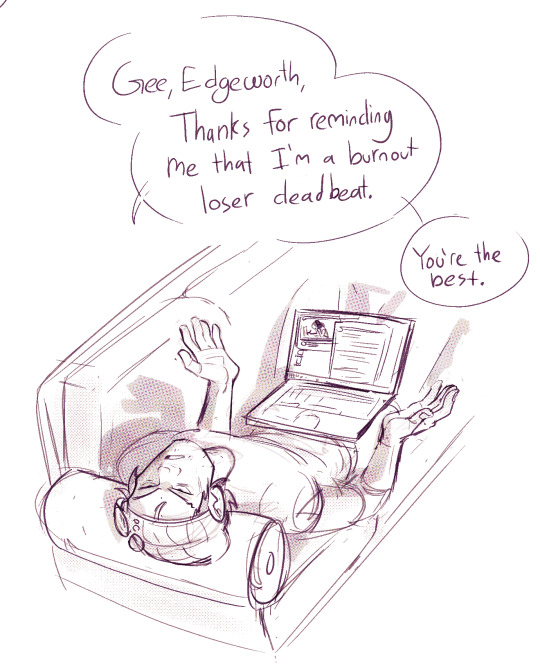
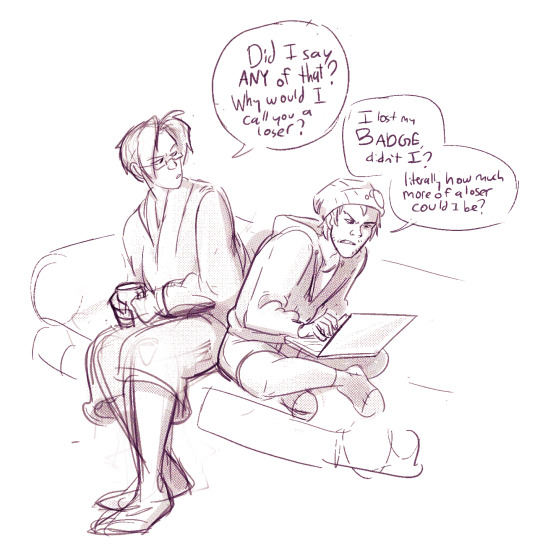

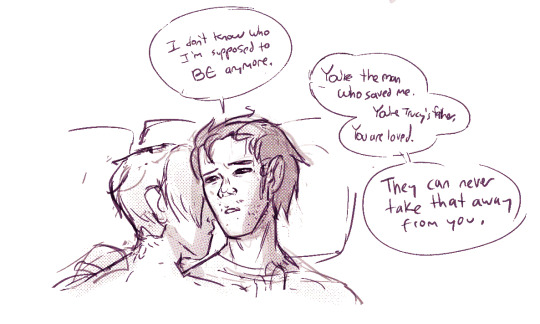
Forget you ever saw me at my best
#narumitsu#wrightworth#phoenix wright#miles edgeworth#ace attorney#im posting my ace attorney doodles here so i don't clog up my art blog with fandom scribbles...#hhhhhhh im sorry for giving phoenix such intense negative self-talk.... it make me sad to see him do it#hopefully its a good reminder of why u shouldnt negative self-talk if you can help it! anyway#dont ask where miles glasses go. this started as some doodles and then halfway through i started stringing them into a comic thing so#my art
3K notes
·
View notes